Home Decor
Is Home Decor Tax Deductible
Intrigued about the tax deductibility of home decor? Explore how differentiating between personal and business use can impact your deductions.
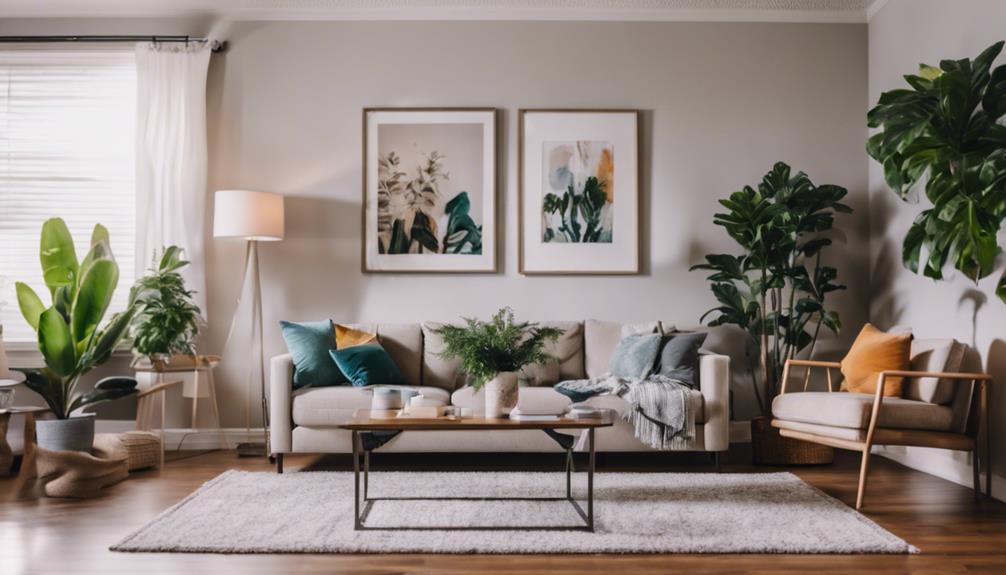
Home decor can be tax deductible if it's solely for business purposes. Items like furniture, lighting, and artwork used exclusively for business activities may qualify. It's important to differentiate between personal and business-related expenses, maintain detailed records, and consult a tax professional for guidance. However, dual-purpose items might need prorating based on business versus personal use. Clear documentation is essential for maximizing deductions, and understanding the distinction between personal and business use is key. By following these guidelines, one can guarantee compliance with tax regulations and potentially maximize deductible home decor expenses further.
Key Takeaways
- Home decor must be exclusively for business use to be tax deductible.
- Business-related items like furniture and lighting fixtures may qualify for deductions.
- Keep detailed records and receipts to support home decor deduction claims.
- Personal or dual-purpose items may not be eligible for tax deductions.
- Consult with tax professionals to ensure compliance and maximize deductions.
Eligibility for Home Office Deduction
When establishing eligibility for the home office deduction, we must verify that the space is used exclusively and regularly for business purposes. This means the home office should be the primary location for conducting business activities and meeting clients or customers.
To qualify for the deduction, the space must also be separately identifiable within the home and used for administrative or management activities. In 2024, individuals can deduct $5 per square foot for exclusive home office space, with a maximum deduction of $1,500 or 300 square feet per year.
Keeping track of all home office expenses, such as repairs, additions, and maintenance costs, is essential as it can lead to a larger deduction for eligible individuals. By ensuring exclusive use and regular usage of the designated home office space, eligible individuals can maximize their tax benefits while complying with the necessary criteria set forth by the IRS.
Criteria for Deductible Home Decor
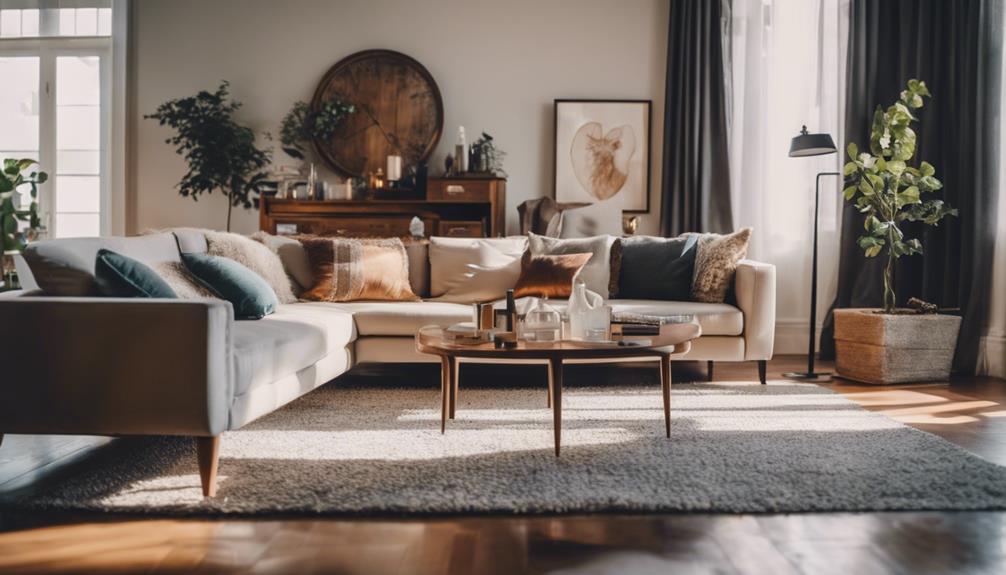
To ensure tax deductions for home decor, it's essential to differentiate between personal and business-related expenses, with only the latter being eligible for claims. When it comes to deductible home decor, expenses must be directly linked to your business activities, such as decorating a home office used exclusively for work purposes or enhancing a client-facing space.
The IRS allows for the deduction of items like furniture, art pieces, lighting fixtures, and other decorative elements that contribute to the business environment. It's important to maintain detailed records and receipts of these expenses to support your deduction claims in case of an audit.
Consulting a tax professional can provide guidance on understanding the complex rules and regulations set forth by the IRS regarding deductible home decor expenses. By ensuring that your home decor costs meet the criteria for business purposes, you can take full advantage of available tax deductions while staying compliant with tax laws.
Directly Related Business Expenses
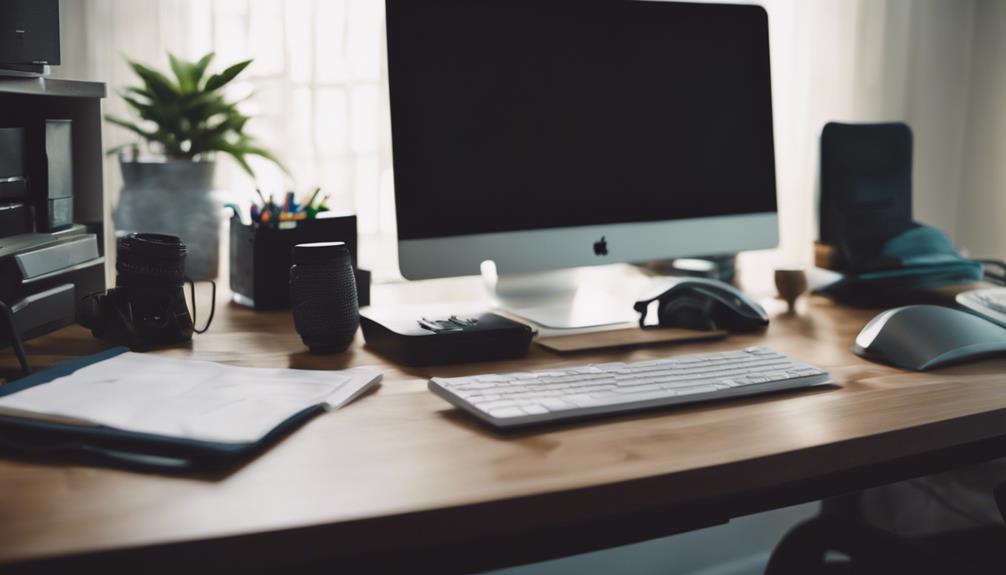
Regularly, expenses directly tied to our home decor business, like the purchase of materials for projects, qualify for tax deductions. These business expenses can include the costs of tools, equipment, and supplies essential for creating home decor items.
Additionally, fees for design software, online courses, or industry memberships that enhance our home decor business are also eligible for tax deductions. When it comes to business-related travel expenses, such as visiting suppliers or attending trade shows for our home decor business, these costs can be included in our tax deductions.
Furthermore, marketing and advertising expenses aimed at promoting our home decor products or services are considered tax deductible for our business. By keeping detailed records of these directly related business expenses, we can maximize our tax deductions and comply with relevant regulations.
Remember to consult with a tax professional to accurately claim these deductions and optimize the financial benefits for our home decor business.
Documentation Requirements for Deductions
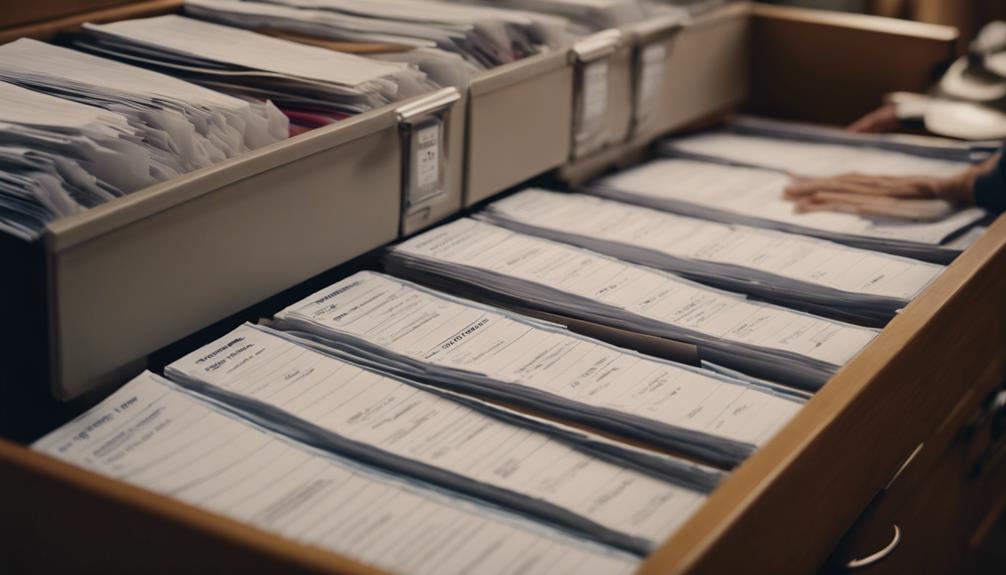
When claiming home decor as a tax deduction, it's vital to have receipts for purchases and proof of home use. These documents serve as evidence for the expenses incurred and the business-related purpose of the decor.
Organizing and updating this documentation regularly guarantees accurate reporting and compliance with tax regulations.
Receipts for Purchases
Keeping detailed receipts for all home decor purchases is essential for substantiating deductions claimed on taxes.
For tax purposes, these receipts must clearly show the item bought, date of purchase, amount spent, and the seller's information. Organized documentation of home decor expenses is important to validate the deductions sought.
During an audit, having proper receipts is critical to prove the legitimacy of these expenses. Whether in physical or digital form, receipts should contain all relevant details to support each purchase.
Proof of Home Use
Proper documentation plays an essential role in supporting tax deductions for home decor by providing evidence of the items' business use and related expenses. To deduct home decor items under the home office tax deduction, it's important to keep detailed records of all expenses, including receipts, invoices, and proof of payment.
These documents help substantiate the purpose of each decor item in relation to your business activities, strengthening your deduction claim. By maintaining organized documentation, you not only streamline the deduction process but also guarantee you have the necessary proof in case of tax audits.
Consultation With Tax Professional
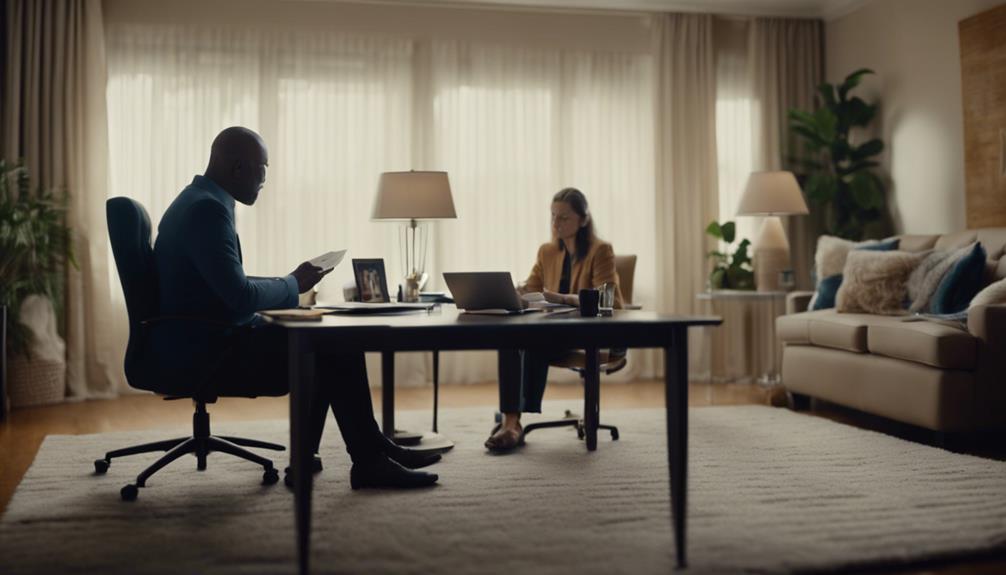
When considering the deductibility of home decor expenses, seeking expert tax advice is essential.
A consultation with a tax professional can provide the personalized guidance needed to navigate the complexities of tax implications related to home decor deductions.
They can clarify the tax implications, assess your specific situation, and guarantee you maximize eligible deductions for your home decor business.
Expert Tax Advice
Seeking guidance from a tax professional can clarify the tax deductibility of home decor expenses tailored to your specific circumstances. Expert tax advice can make a significant difference in understanding the nuances of tax deductions related to home decor expenses.
Here are some key points to keep in mind:
- Tax professionals can provide insights on eligibility criteria for deducting home decor expenses.
- They can help you navigate documentation requirements for claiming these deductions.
- Understanding the distinction between personal and business-related expenses is important.
- They can identify potential deductions you might've overlooked.
- Expert advice can guarantee accurate tax filings and maximize your tax savings.
Professional Guidance Needed
Understanding the complexities of tax laws and regulations related to home decor deductions often requires the expertise of a tax professional. When it comes to determining if home decor expenses are tax deductible, consulting with a tax professional is essential. They can help navigate the intricacies of deductions, ensuring compliant reporting of expenses.
Tax professionals offer valuable insights to maximize deductions and minimize tax liabilities for home decor businesses. By working with a tax professional, home decor business owners can make informed decisions to optimize tax benefits. Their guidance is essential in ensuring that you're taking full advantage of available deductions while staying compliant with tax laws.
Tax Implications Clarified
Upon consulting with a tax professional, clarity on the tax implications of home decor expenses for business activities can be obtained.
- Proper documentation of expenses is essential for accurate tax reporting.
- Deductions for home decor expenses depend on whether they're for personal or business use.
- Understanding tax implications helps maximize deductions and minimize tax liabilities.
- Consultation with a tax professional is recommended for specific guidance.
- Expenses must be ordinary and necessary for business operations to be tax deductible.
Dual-Purpose Decor Limitations
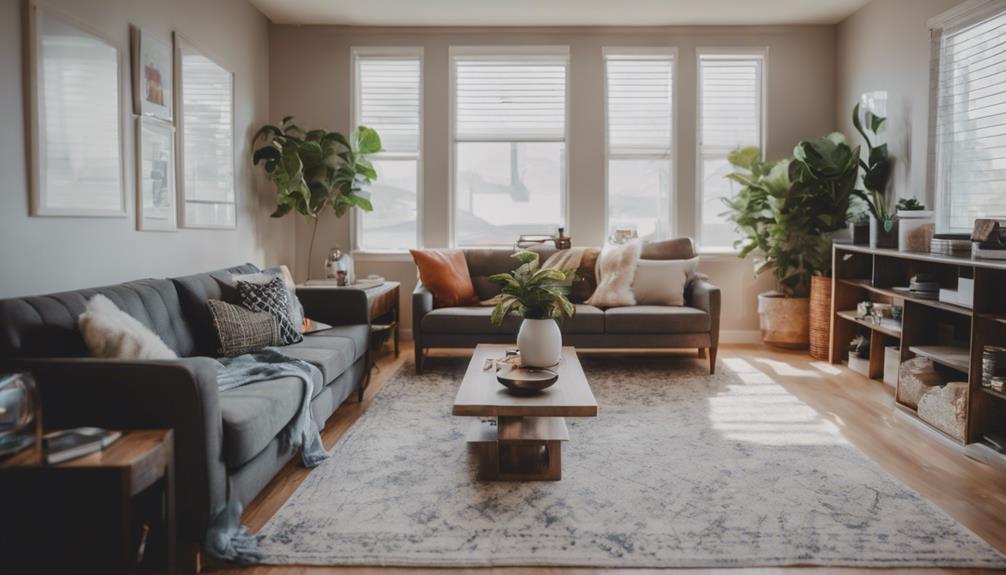
When considering dual-purpose decor limitations for tax deductions, it's important to distinguish between personal enjoyment and legitimate business expenses.
Home decor expenses that serve both personal and business purposes are generally not deductible. If the primary purpose of the decor is personal enjoyment, it doesn't qualify as a legitimate business expense.
The IRS only allows deductions for expenses that are exclusively for business use, not for personal enjoyment. In cases where items like home decor have a dual purpose, such as being used for both personal and business reasons, the deduction may need to be prorated based on the percentage of business versus personal use.
This proration ensures that only the portion of the expense directly related to the business can be deducted. Understanding these dual-purpose decor limitations is important for maintaining compliance with tax regulations and maximizing legitimate deductions for business expenses.
Importance of Clear Records
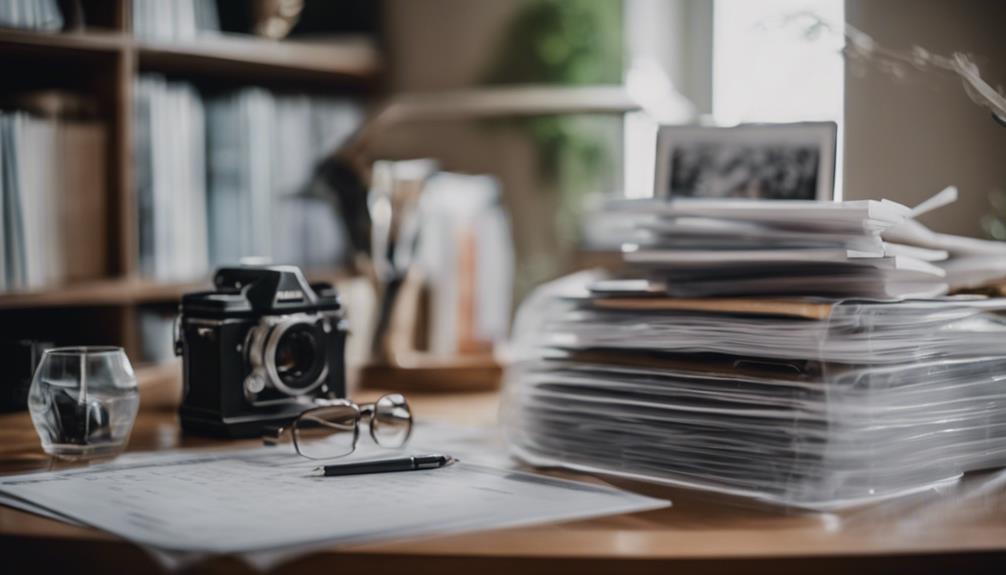
To effectively claim tax deductions for home decor, maintaining clear records of expenses is essential. Keeping detailed documentation of your home decor expenses isn't only a good practice but also necessary for proving the legitimacy of your deductions to the IRS.
Here are five reasons why clear records are vital for maximizing your deductions:
- Proof of Expenses: Clear records serve as evidence of the money spent on home decor items.
- Compliance: Maintaining receipts, invoices, and records guarantees compliance with tax regulations.
- Calculating Deductions: Accurate records make it easier to calculate the percentage of home decor expenses that can be deducted.
- Differentiating Personal vs. Business Expenses: Clear records help distinguish personal expenses from deductible business expenses related to home decor.
- Home Office Deductions: For those claiming home office deductions, detailed documentation of home decor expenses is particularly significant.
Home Decor Items for Deduction
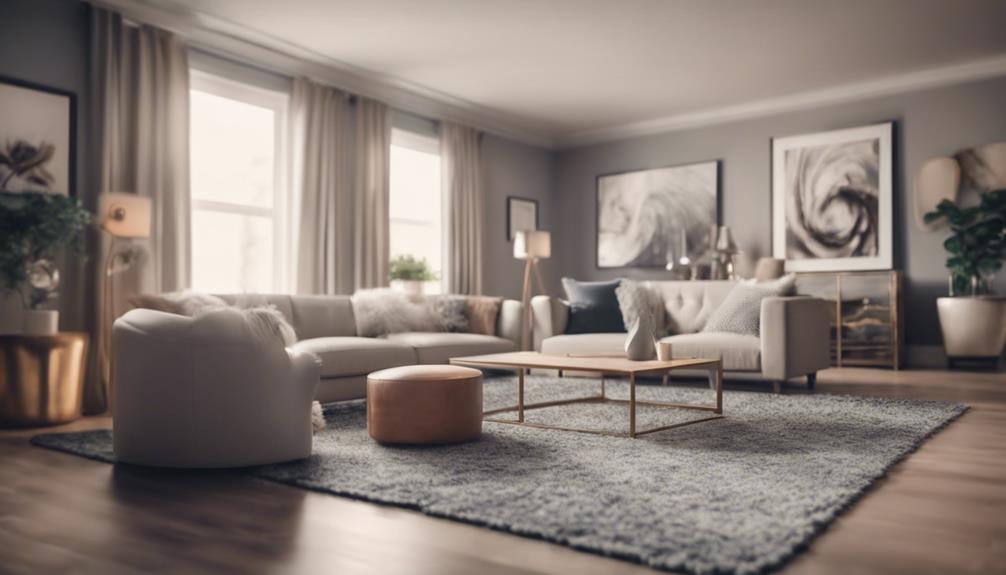
Clear documentation of home decor items used for business purposes is essential for maximizing tax deductions. When selecting home decor items for deduction, it's important to choose pieces that are exclusively for business activities, such as staging a property for sale or enhancing a home decor blog.
Eligible items may include furniture, lighting, rugs, curtains, artwork, and other decor elements directly related to income generation. Remember, the key criterion for deducting these items is their direct link to business operations.
To support deduction claims during tax filing, maintaining thorough records and retaining receipts of home decor purchases is necessary. Consulting with a tax professional can provide guidance on ensuring tax compliance when deducting home decor items for business purposes.
Business Vs. Personal Use Assessment
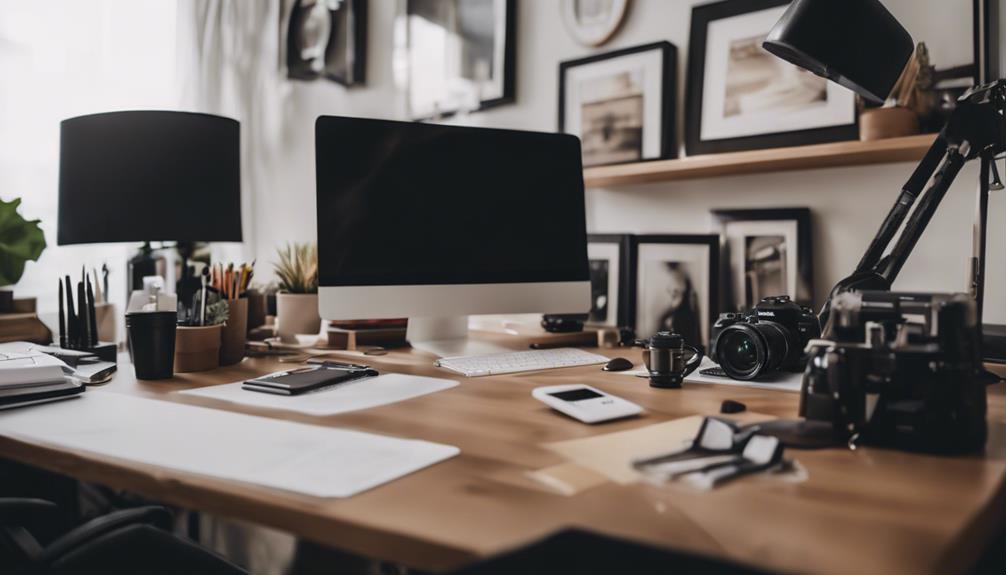
Evaluating the difference between business and personal use is essential when determining the tax deductibility of home decor expenses. When it comes to home decor, distinguishing between business and personal use can have a notable impact on the deductibility of expenses.
Here are some key points to keep in mind:
- Home decor expenses are tax deductible for business use, such as staging a property for sale.
- DIY projects or home decor purchases for personal enjoyment are generally not eligible for tax deductions.
- Keeping detailed records of home decor expenses for business purposes is important for claiming deductions.
- Expenses related to home decor used in a business context can be deducted, while those for personal use cannot.
- Understanding the distinction between personal and business use is crucial in maximizing the deductibility of home decor expenses.
Frequently Asked Questions
Is Decorating a Home Office Tax-Deductible?
Decorating a home office for business purposes can be tax-deductible if the expenses are directly related to the business. Business-related decor items like furniture, lighting, and office supplies can be considered deductible expenses. Personal decorative items not used for business purposes are generally not eligible for tax deductions.
The key factor is ensuring that the decor expenses are necessary and ordinary for running a business from the home office. Keeping detailed records of all decor expenses for the home office is essential for tax purposes.
Can You Write off Interior Design?
Interior design expenses can be tax deductible if incurred for business purposes, like designing client spaces. Deductible costs include consultations, materials, and labor.
For personal home decor, deductions are generally not allowed. To claim these deductions, keep detailed records and receipts. Consult a tax professional for accuracy.
Proper record-keeping is essential for claiming interior design expenses on taxes.
Are Christmas Decorations Tax-Deductible?
Christmas decorations used in a business context, such as for staging a home or for events, can be tax-deductible if directly related to business activities. To qualify for the deduction, keep detailed records and receipts of the decorations purchased.
Seek advice from a tax professional to confirm eligibility and proper documentation. Remember, the key is showing a clear link between the decorations and your business. It's crucial to have the necessary paperwork to support your claim.
What Home Improvements Are Tax-Deductible Irs?
When it comes to tax deductions for home improvements, it's crucial to know what qualifies. Certain upgrades, like energy-efficient renovations or modifications for medical reasons, may be eligible. However, general repairs or cosmetic changes typically don't make the cut.
It's wise to consult with a tax professional or check IRS guidelines to make sure you understand what home improvements can be tax-deductible.
Conclusion
To sum up, while it may be tempting to try and deduct your home decor expenses on your taxes, it's important to remember the criteria that must be met in order to qualify.
Consulting with a tax professional can help navigate the complexities of deductions and guarantee compliance with the IRS regulations.
So, before you start counting your throw pillows as business expenses, make sure you understand the rules to avoid any unexpected audits or penalties.
Home Decor
Floral Vs. Plaid: Which Is Better for Your Country Living Room?
Overwhelmed by the choice between floral and plaid for your country living room? Discover which pattern will truly transform your space!
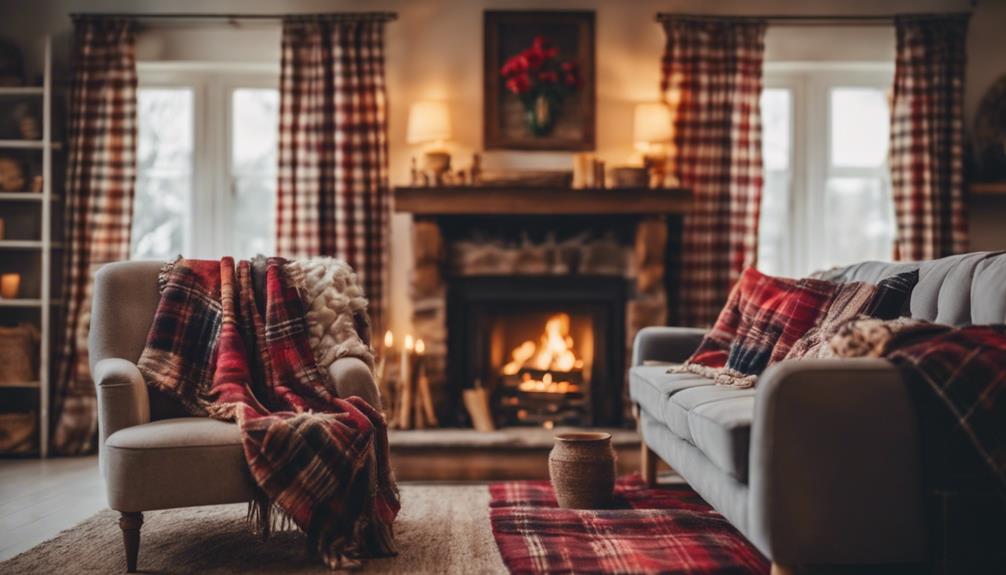
When deciding between floral and plaid for your country living room, consider the vibe you want to create. Floral patterns add warmth and vibrancy, making your space feel cheerful and inviting. On the other hand, plaid offers a more muted, rustic charm with grounded aesthetics. You can mix textures, using soft floral materials alongside sturdy plaid fabrics for balance. Don't forget to incorporate unique lighting and decorative elements like vintage items to enhance the overall feel. The choice really depends on your personal style and the atmosphere you wish to achieve in your home. Explore your options for a perfect blend!
Key Elements
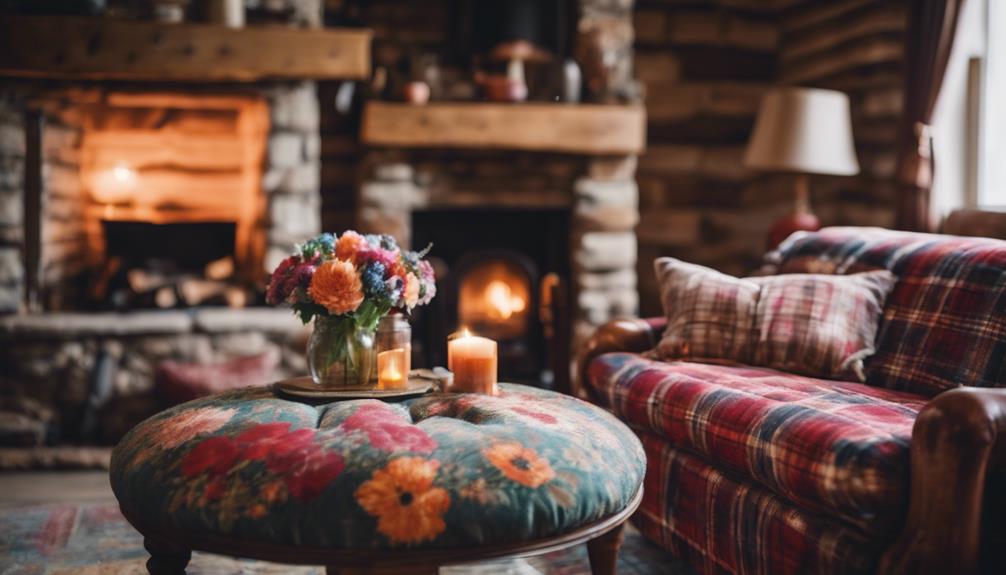
When choosing between floral and plaid for your country living room, consider the key elements of color scheme, materials, and textures.
Each pattern brings its own unique vibe to the space, so think about how they can harmonize with your existing decor.
Color Scheme
A well-chosen color scheme can seamlessly blend floral and plaid patterns, enhancing the cozy charm of your country living room. Floral patterns often bring a burst of warmth and vibrancy, creating a cheerful atmosphere. In contrast, plaid designs typically favor muted colors, lending a rustic feel that complements natural materials and earthy tones.
To achieve balance, consider incorporating warm neutrals and earthy colors, such as rich browns and muted greens. These shades not only ground the overall design but also allow floral accents to shine without overwhelming the space. For instance, a bright floral cushion can pop against a muted plaid sofa, creating visual interest while maintaining harmony.
When selecting a color scheme, make certain that the hues across both floral and plaid elements are cohesive. This approach fosters a seamless blend, preventing any clash between the lively florals and structured plaids.
Materials
Choosing the right materials is key to harmonizing floral and plaid patterns in your country living room, as each fabric type contributes to the overall aesthetic and comfort of the space.
Floral patterns often feature vibrant colors and intricate designs, typically crafted from soft materials like cotton or linen. These fabrics bring warmth and liveliness, making them perfect for soft furnishings like cushions and curtains.
On the other hand, plaid patterns provide a classic, cozy vibe, usually made from more durable materials such as wool or tweed. These fabrics add rustic charm and are ideal for heavier items like throws and upholstery, enhancing the traditional feel of your room.
When you consider wall treatments, floral wallpapers can create a cheerful backdrop, while plaid can lend a grounded, timeless look, especially in accent walls.
To achieve a balanced and inviting space, mix these materials thoughtfully. Use floral patterns to soften the boldness of plaid, ensuring that both styles complement each other.
Textures
To create a warm and inviting country living room, mixing a variety of textures—from soft cotton and wool to natural elements like wood and stone—plays an essential role in crafting a cozy atmosphere. Soft textiles like cotton or wool for upholstery not only provide comfort but also enhance the overall warmth of your space.
Incorporating natural materials, such as weathered wood and stone, contributes to the rustic charm that defines country living. You can achieve depth and visual interest by layering various textures, like chunky knit blankets paired with plaid pillows. This layering enhances the cozy atmosphere you're aiming for.
Vintage furniture pieces add unique textures and history to your decor, creating a personalized and inviting environment. Consider mixing finishes, like distressed metals alongside soft fabrics, to balance the rustic aesthetic while introducing a touch of modernity.
Essential Fixtures and Furniture
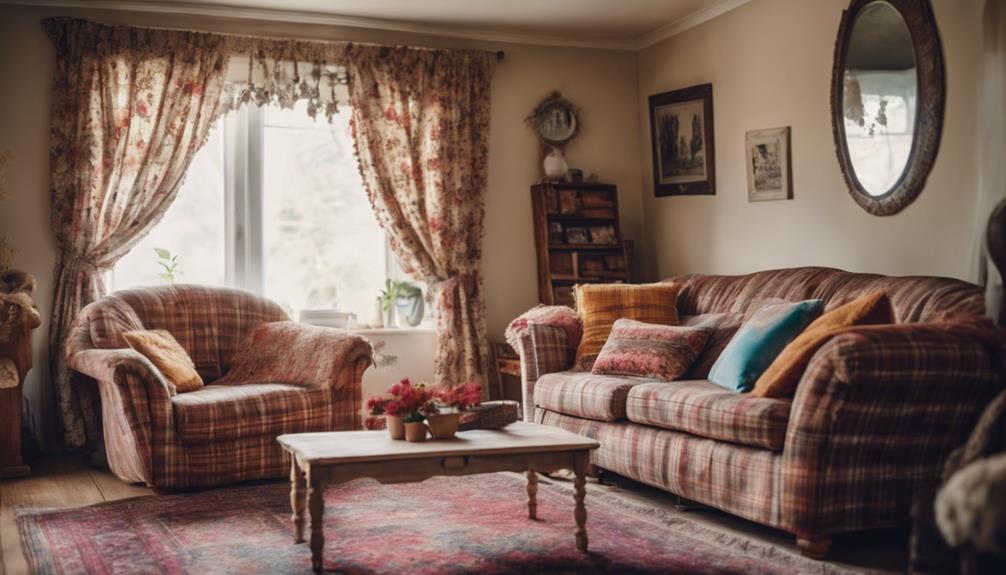
When it comes to essential fixtures and furniture for your country living room, you'll want to focus on key pieces that enhance the overall aesthetic.
A vintage farmhouse dining table, an antique sideboard with character, and a rustic farmhouse coffee table can create a warm and inviting atmosphere.
These elements not only complement floral or plaid designs but also reinforce the rustic charm you're aiming for.
Vintage Farmhouse Dining Table
A vintage farmhouse dining table adds a touch of rustic charm and durability to your country living room, making it an essential piece for both family meals and gatherings.
These tables often feature solid wood construction that emphasizes their durability while enhancing the rustic aesthetic of your space. With their distressed finishes, they not only provide a sense of history but also exude warmth, making your home feel cozy and inviting.
You'll find that vintage farmhouse tables come in various sizes, perfectly accommodating everything from intimate dinners to larger family gatherings. Their sturdy legs and unique design elements, like turned legs or trestle bases, enhance both functionality and style, ensuring they stand out in any country home.
Plus, incorporating a vintage farmhouse dining table into your decor allows you to mix and match with other traditional elements, such as mismatched chairs or colorful table settings, creating a welcoming atmosphere.
In essence, a vintage farmhouse dining table is more than just furniture; it's a centerpiece that brings people together, making it an indispensable addition to your country living room.
Antique Sideboard With Character
An antique sideboard often becomes the focal point of your country living room, offering both style and practical storage solutions. This piece of antique furniture can serve as a functional centerpiece, allowing you to store items while displaying vintage dishes or cherished family heirlooms. Its unique character often comes from distressed finishes and historical craftsmanship, which add a rustic touch that enhances the room's overall aesthetic.
Made from solid wood, many antique sideboards provide durability and a timeless appeal, perfectly complementing other natural materials in your decor. Selecting a sideboard with intricate carvings or distinctive hardware not only enhances the vintage style but also makes it a conversation starter for your guests.
Rustic Farmhouse Coffee Table
Building on the charm of an antique sideboard, a rustic farmhouse coffee table serves as a practical yet stylish centerpiece in your country living room. Typically crafted from reclaimed wood, these coffee tables emphasize sustainability while showcasing unique character in every piece. The distressed finish not only enhances the vintage aesthetic but also complements other elements within farmhouse interiors.
When choosing your coffee table, consider the size to guarantee it fits comfortably within your seating area. It should allow for easy access and flow, making your living space inviting. Many rustic farmhouse coffee tables come equipped with functional features like storage drawers or shelves, perfect for keeping your cozy area organized.
You can also personalize your choice with various styles, such as farmhouse chic or industrial farmhouse, allowing the coffee table to seamlessly blend with your overall decor. Whether you're enjoying a cup of coffee or entertaining guests, a rustic farmhouse coffee table provides both functionality and charm, making it an essential fixture in your country living room.
Lighting Ideas
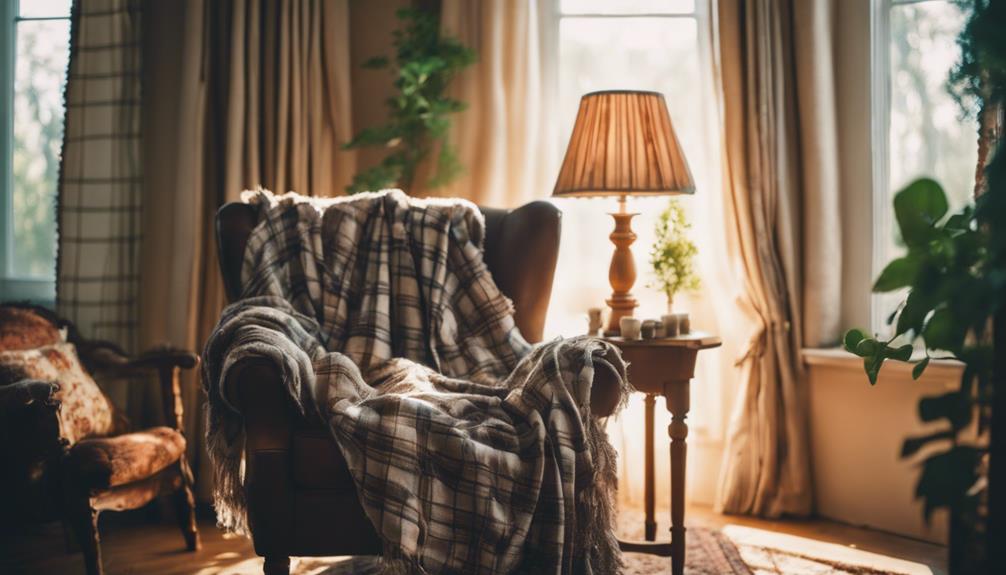
When it comes to lighting your country living room, think about incorporating rustic lanterns for that cozy ambiance.
Vintage Edison bulb fixtures and antique-style table lamps can add a touch of charm, while charming candle chandeliers create a warm glow for intimate gatherings.
Layering these elements will enhance the overall aesthetic and make your space feel inviting.
Rustic Lanterns for Ambient Lighting
Rustic lanterns create a warm, inviting glow that perfectly complements the natural materials and cozy decor of your country living room. These charming fixtures enhance ambient lighting by providing a soft radiance that makes your space feel welcoming and comfortable. You can find rustic lanterns in various styles, including wrought iron, wood, and glass, allowing you to choose options that resonate with your personal taste.
Hang them from ceilings to illuminate your room or place them on tables for added visual interest. Many rustic lanterns come equipped with flickering LED candles or traditional candle placements, giving you a safe yet authentic glow reminiscent of old-world charm. By incorporating these lanterns into your decor, you can create focal points that highlight architectural features like exposed beams or stone fireplaces.
Don't hesitate to mix sizes and styles of rustic lanterns; this adds depth and texture to your living room, helping create a layered and inviting atmosphere. With the right placement, rustic lanterns can transform your space into a cozy retreat, making it the perfect spot for relaxation and gatherings.
Vintage Edison Bulb Fixtures
Vintage Edison bulb fixtures effortlessly bring a nostalgic charm to your country living room, enhancing its inviting atmosphere with their warm glow and classic design.
These fixtures, featuring exposed filaments, emit a soft light that creates a cozy atmosphere perfect for relaxation or entertaining guests.
You'll find vintage Edison bulb fixtures in various styles, including pendant, chandelier, and wall sconces, making it easy to complement your space's rustic charm.
When strategically placed, they can serve as a focal point, drawing attention to your room's architectural features like exposed beams or rustic furnishings.
If you're looking for an eco-friendly option, consider energy-efficient LED Edison bulbs.
They maintain the vintage look while reducing energy consumption and extending bulb life, allowing you to enjoy the aesthetic without compromising on sustainability.
Incorporating these fixtures into your lighting design not only enhances the ambiance but also ties together diverse elements of your decor.
Whether you prefer a traditional or modern take on country style, vintage Edison bulb fixtures can elevate your living room, creating a warm and inviting space that reflects your personal taste.
Antique-style Table Lamps
While vintage Edison bulb fixtures set the mood, incorporating antique-style table lamps can further enhance the charm and sophistication of your country living room. These lamps often feature intricate designs and materials like brass, porcelain, or stained glass, adding a timeless elegance that complements rustic decor. Their unique shades, crafted from vintage fabrics or glass, can elevate the character of your space, offering decorating ideas that truly stand out.
Antique-style table lamps aren't just decorative; they provide both ambient and task lighting, helping to create a cozy atmosphere. Think about placing them on side tables or console tables to add warmth and functionality. When selecting the right lamps, pay attention to their height and scale in relation to your furniture to maintain a harmonious balance in your room.
Furthermore, these lamps showcase craftsmanship from different eras, making them conversation starters and focal points in your living room. By choosing antique-style table lamps, you'll not only illuminate your space but also infuse it with a touch of nature and history, enriching the overall ambiance of your country living room.
Charming Candle Chandeliers
Candle chandeliers can transform your country living room with their warm, inviting glow and charming designs that highlight natural materials and vintage decor. These fixtures are perfect for enhancing the rustic aesthetic of your space, providing a cozy ambiance that encourages gatherings and relaxation.
When you choose charming candle chandeliers, look for options featuring intricate designs, such as wrought iron or distressed wood. These elements add character and elegance, making your chandelier a stunning focal point. Opting for chandeliers that hold multiple candles guarantees your rustic living room is well-lit, creating an inviting atmosphere.
Consider varying the heights of your candle chandeliers to add visual interest and depth to your decor. This layering technique enhances the texture typical of country living rooms, making them feel more dynamic.
Decorative Elements
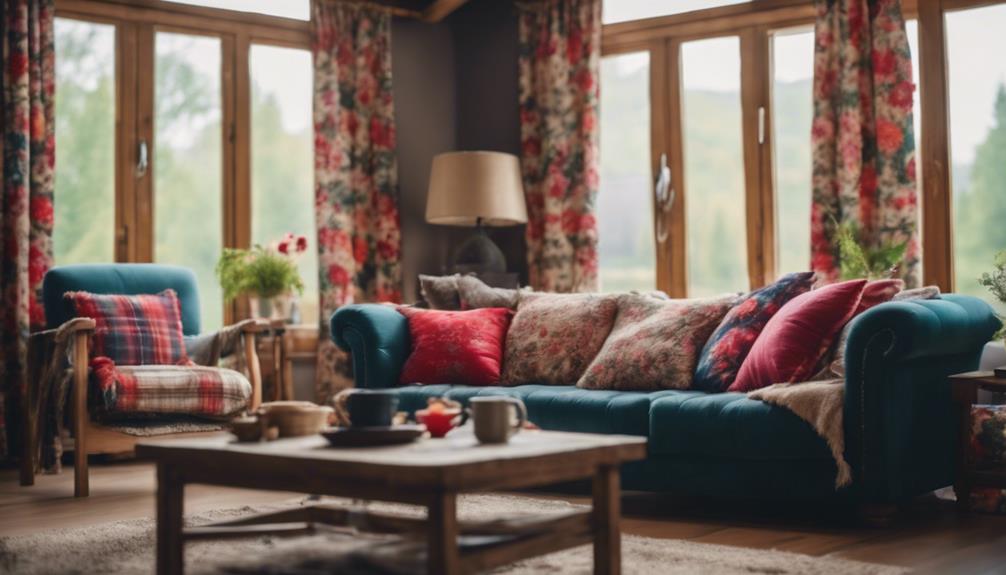
When it comes to decorative elements, think about incorporating handcrafted ceramic vases, vintage floral wall art, and woven wicker wall baskets.
These pieces not only enhance the country charm but also reflect your personal taste.
Handcrafted Ceramic Vase
How can handcrafted ceramic vases enhance the charm of your country living room? These unique decor pieces bring an artisanal charm that perfectly complements your rustic decor.
With their earthy glazes and textures, handcrafted ceramic vases introduce a natural feel that resonates with the warmth of your space.
You can use them as focal points by filling them with fresh flowers or dried arrangements, instantly adding color and life to the room. The beauty of these vases lies in their versatility; they come in various sizes, shapes, and colors, allowing you to create arrangements that reflect your individual style.
Incorporating handcrafted ceramic vases into your decor not only elevates the aesthetic but also adds a personal touch. Each piece showcases your appreciation for craftsmanship and supports local artisans, making your home feel more connected to the community.
Whether you opt for a single statement vase or a collection, these elements will enhance the overall ambiance of your country living room, making it a cozy retreat that tells your unique story.
Vintage Floral Wall Art
Vintage floral wall art adds a touch of nostalgia and warmth, making it a perfect focal point for your country living room. These art pieces often showcase intricate patterns and muted tones, which evoke tranquility and a connection to nature.
When you choose vintage floral wall art, you enhance the overall color palette of your space, allowing it to blend seamlessly with soft furnishings and wood accents. Incorporating these pieces into your decor not only complements rustic decor but also adds character and individuality to the room.
You can easily mix and match vintage floral art with other styles, like plaid or gingham, to create a layered and inviting aesthetic. This versatility allows you to express your personal style while maintaining a cozy atmosphere.
When selecting vintage floral wall art, consider how it reflects your tastes and the mood you want to create. By thoughtfully integrating these elements, you can transform your country living room into a warm, welcoming haven that feels uniquely yours.
Embrace the charm of vintage floral wall art, and let it breathe life into your decor!
Woven Wicker Wall Baskets
Woven wicker wall baskets bring a unique blend of texture and warmth to your country living room, instantly enhancing its cozy charm. These versatile decorative elements can serve dual purposes, acting as both storage solutions for items like magazines or throws and as stylish accents that complement rustic decor.
Available in various sizes and shapes, you can arrange woven wicker wall baskets in groupings to create an eye-catching focal point on a blank wall. This arrangement not only adds visual interest but also brings a sense of balance to the space. Incorporating natural materials like wicker helps connect your indoor area with nature, aligning perfectly with the essence of country living design principles.
Another advantage of woven wicker wall baskets is their adaptability. You can easily style them with seasonal decor, such as dried flowers or greenery, making them a dynamic addition to your living room decor.
Flooring
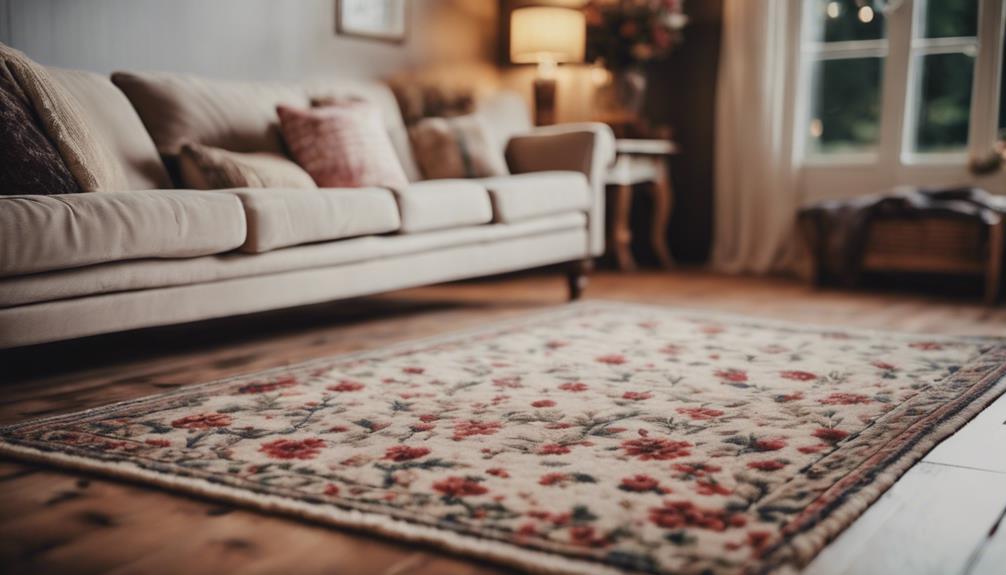
When it comes to flooring for your country living room, you can't go wrong with options like reclaimed barnwood plank or wide plank oak, both of which bring a rustic charm.
Hand-scraped maple hardwood offers a classic touch that pairs beautifully with floral and plaid patterns.
Choosing the right flooring will set the tone for your space, so consider your style carefully.
Reclaimed Barnwood Plank Flooring
Reclaimed barnwood plank flooring brings a unique blend of sustainability and rustic charm to your country living room, making it a standout choice for your home's aesthetic. This flooring option not only reduces waste but also infuses your space with character and history through its weathered wood appearance. Each plank showcases natural beauty with variations in color and texture, creating a cozy atmosphere that complements both floral and plaid design elements.
Choosing reclaimed barnwood means you're investing in durability. Its age and history often make it more resilient than new wood, ensuring it can withstand the everyday wear and tear of family life. Plus, the rustic vibe of reclaimed wood pairs beautifully with country living room decor, enhancing the overall warmth of your space.
Moreover, installing reclaimed barnwood flooring can increase your home's value. Buyers often seek authentic, rustic charm in country-style interiors, and this flooring delivers just that.
Wide Plank Oak Flooring
Wide plank oak flooring offers a perfect blend of durability and rustic elegance, making it an ideal choice for your country living room. This flooring type is known for its strength, perfect for high-traffic areas where family and friends gather. The natural grain patterns and rich color variations of oak enhance the rustic charm of your space, creating a warm and inviting atmosphere.
With widths ranging from 5 to 12 inches, wide plank oak flooring adds a sense of spaciousness and visual interest to your living room. You can easily incorporate this flooring into various country living room ideas, pairing it with wood accents to emphasize the natural elements in your decor. Plus, oak flooring comes in various stains and finishes, allowing you to customize the look to fit your desired aesthetic—whether you prefer a light farmhouse vibe or a dark, cozy retreat.
Maintenance is a breeze, too. Regular sweeping and occasional refinishing will keep your wide plank oak flooring looking stunning for years to come. In short, this flooring option perfectly balances beauty and practicality, making it a standout choice for your country living room.
Hand-scraped Maple Hardwood Flooring
Hand-scraped maple hardwood flooring brings a textured finish that enhances the rustic charm of your country living room, offering a stylish alternative to wide plank oak. This flooring's unique hand-scraped finish varies in depth and design, giving your space a personalized look that radiates character.
In country-style living, the fine, uniform grain pattern of maple naturally complements both floral and plaid decor, creating a cohesive aesthetic that ties your room together. Plus, maple is one of the hardest domestic hardwoods, making it a durable choice for high-traffic areas. You won't have to worry about wear and tear, ensuring your flooring looks great for years to come.
Maintaining hand-scraped maple flooring is straightforward. Regular sweeping keeps it clean, while occasional refinishing preserves its beauty and durability over time.
Choosing this type of flooring not only enhances the rustic appeal of your living space but also aligns with your practical needs. So, if you're aiming for a cozy, inviting atmosphere in your country living room, hand-scraped maple hardwood flooring might just be the perfect fit.
Conclusion
Ultimately, whether you choose floral or plaid for your country living room depends on your personal style and the vibe you want to create.
Floral patterns can bring a soft, romantic touch, while plaid adds a cozy, rustic feel.
Remember to balance your choice with essential fixtures, lighting, and decorative elements that enhance the overall look.
Whichever you pick, make sure it reflects your personality and makes your living space inviting and warm.
Enjoy decorating!
Home Decor
Incorporate Natural Elements Into Your Home Decor – the Results Are Jaw-Dropping!
Discover how incorporating natural elements into your home decor can create a stunning retreat that enhances your mood and well-being—are you ready to transform your space?
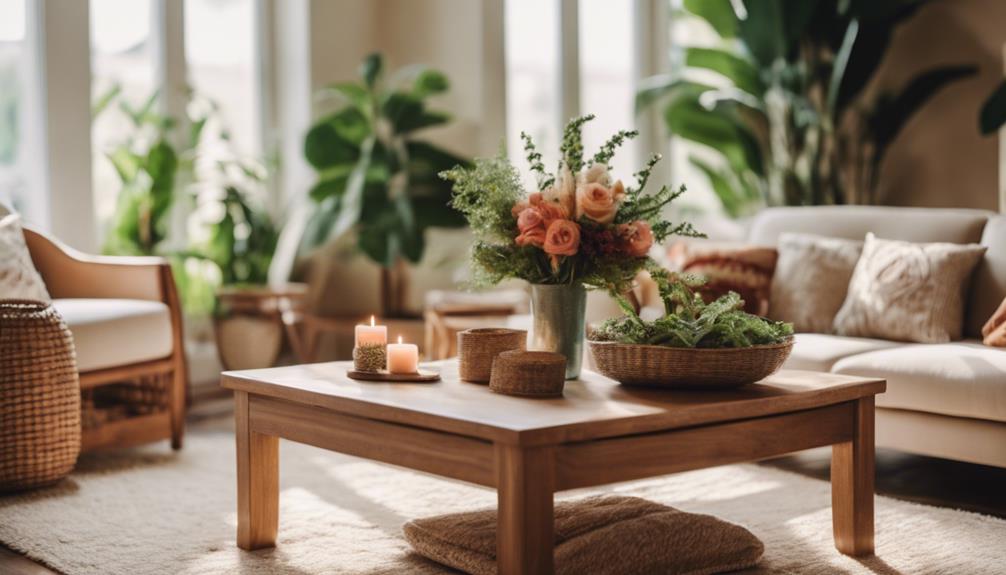
Incorporating natural elements into your home decor can truly transform your space into a stunning retreat. You can enhance your mood and well-being by maximizing natural light and adding greenery, which purifies the air and reduces stress. Opt for sustainable materials like wood and stone, and layer organic textures for a warm, inviting atmosphere. Simple touches, like hanging planters or indoor herb gardens, add vibrancy and life. By connecting with nature through biophilic design, you create an ambiance that feels both tranquil and alive. There's so much more to discover about making your home a peaceful oasis!
Key Takeaways
- Integrate indoor plants to improve air quality and create a calming atmosphere for relaxation and mental well-being.
- Maximize natural light with larger windows or mirrors to enhance mood and productivity in your living spaces.
- Use sustainable materials like bamboo and reclaimed wood to promote eco-friendly decor while adding unique textures to your home.
- Layer natural textures such as jute, cotton, and stone to create warmth and visual interest in your interior design.
Understanding Biophilic Design
Biophilic design connects you with nature by bringing natural elements like light, materials, and greenery into your home. This approach emphasizes your inherent desire to connect with the environment, creating spaces that feel more alive and inviting. By incorporating biophilic design, you can maximize natural light, which not only brightens your space but also positively impacts your mood and energy levels.
Using natural materials in your home decor is an essential aspect of biophilic design. Think about integrating wood, stone, and organic textiles that reflect the beauty of nature. These materials not only create a warm atmosphere but also promote sustainability, aligning with eco-friendly living practices. When you choose natural materials, you're not just enhancing the aesthetics of your space; you're also fostering a deeper connection with the outdoors.
Incorporating plants into your living areas is another fundamental element of biophilic design. They purify the air and provide a calming presence, which is vital for your mental well-being.
Key Benefits of Natural Elements
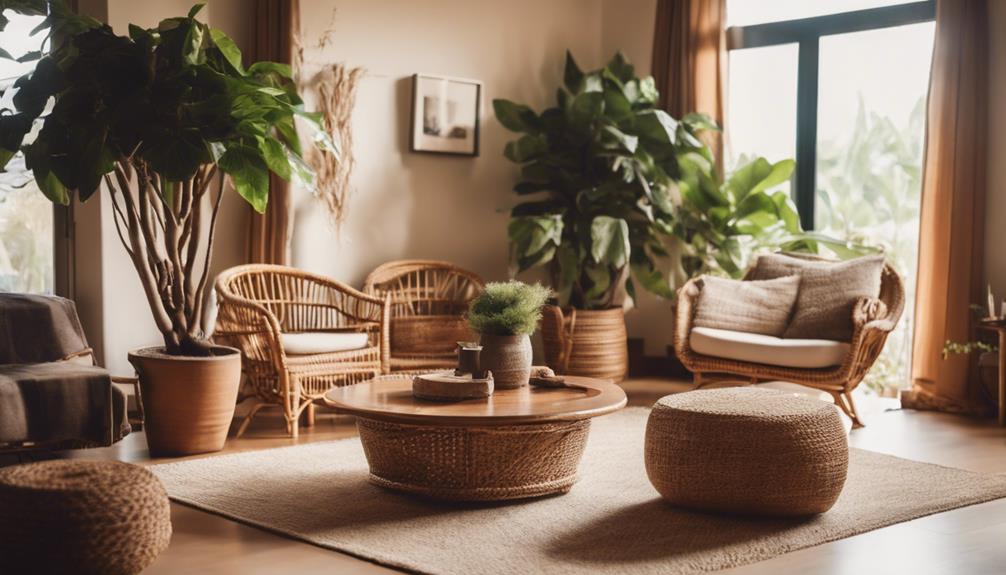
When you incorporate natural elements into your home, you're not just beautifying your space; you're also boosting your well-being.
Improved air quality, stress reduction, and a better mood are just a few of the benefits that come from infusing your decor with nature.
Let's explore how these key advantages can transform your living environment.
Enhanced Air Quality
Incorporating natural elements like plants and wood into your home decor not only beautifies your space but also boosts air quality, making your environment healthier and more inviting. Indoor plants act as natural components that absorb toxins while releasing oxygen, effectively purifying the air you breathe. This leads to a healthier living area where you can thrive.
Moreover, using wood in your decor helps regulate indoor humidity levels. By doing so, it reduces the presence of allergens, making your home more comfortable and enjoyable.
Stone surfaces are another excellent choice, as they're easy to clean and help minimize dust and allergens that could affect your respiratory health.
Stress Reduction Techniques
Natural elements like plants and wood can transform your home into a serene retreat that effectively reduces stress and promotes relaxation. Incorporating natural elements into your decor creates calming spaces that help you unwind after a long day. The presence of indoor plants not only enhances the aesthetic but also fosters mindfulness and tranquility, making it easier for you to let go of daily tensions.
Biophilic design, which emphasizes a connection to nature, supports improved mental health by encouraging restful environments. When you surround yourself with natural materials, you're more likely to experience a sense of calm and comfort. These stress reduction techniques can markedly lower your anxiety levels, allowing for a more peaceful atmosphere.
Moreover, the beauty of wood and greenery evokes positive emotional responses, transforming any room into a sanctuary. As you create spaces that reflect nature, you're also paying tribute to your well-being.
Improved Mood Boosts
Surrounding yourself with natural elements not only creates a calming space but also greatly boosts your mood and overall well-being. By integrating these elements into your home, you can experience significant emotional benefits.
Here are three key ways natural elements can elevate your mood:
- Enhanced Natural Light: Maximizing natural light through large windows or skylights can increase serotonin levels, making you feel happier and more energetic.
- Invigorating Organic Textures: Incorporating wood, stone, and plants provides organic textures that create a warm, inviting atmosphere. This connection to nature can reduce anxiety and enhance relaxation.
- Nature-Inspired Colors: Using soft greens and earthy tones in your decor fosters a tranquil environment, improving mental clarity and emotional stability.
Integrating Greenery Into Spaces
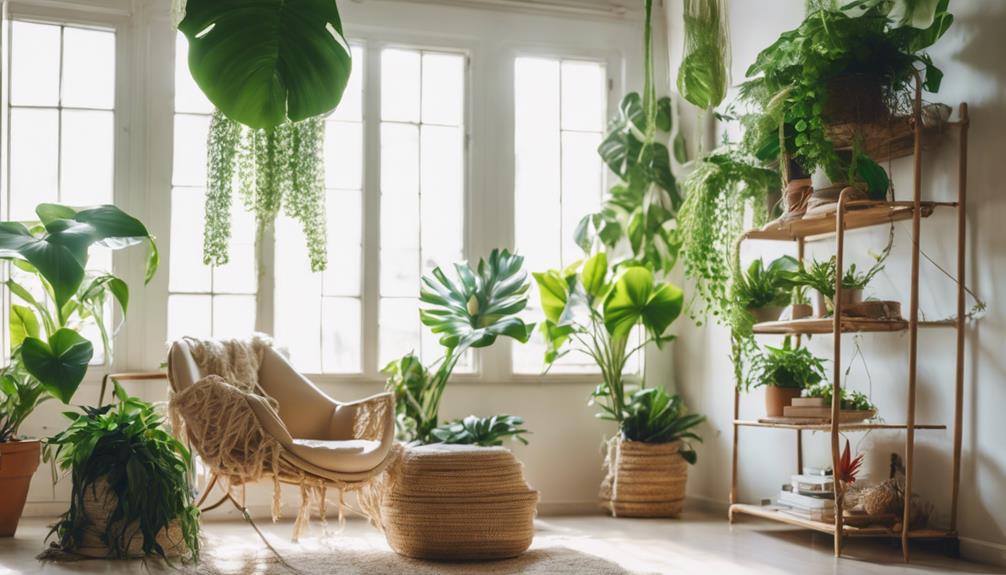
Bringing greenery into your spaces can breathe new life into your home while improving air quality and creating a soothing atmosphere. Integrating greenery into your home decor not only enhances visual appeal but also promotes well-being. Start by incorporating small potted plants, like succulents or ferns, to revitalize dull surfaces. Grouping plants in odd numbers creates a visually balanced and inviting environment.
Consider mixing various types of greenery to add depth; airy ferns paired with sturdy succulents can create beautiful contrasts. Indoor herb gardens are a great option, too, offering aromatic benefits that enhance your culinary experiences in the kitchen.
To maximize space, utilize hanging planters or wall-mounted greenery, especially in smaller areas, making them feel vibrant and connected to nature.
Here's a helpful guide to get started:
| Plant Type | Benefits |
|---|---|
| Succulents | Low maintenance, unique shapes |
| Ferns | Air-purifying, lush texture |
| Herbs | Aromatic, culinary use |
| Hanging Plants | Space-saving, visual interest |
The Role of Natural Light
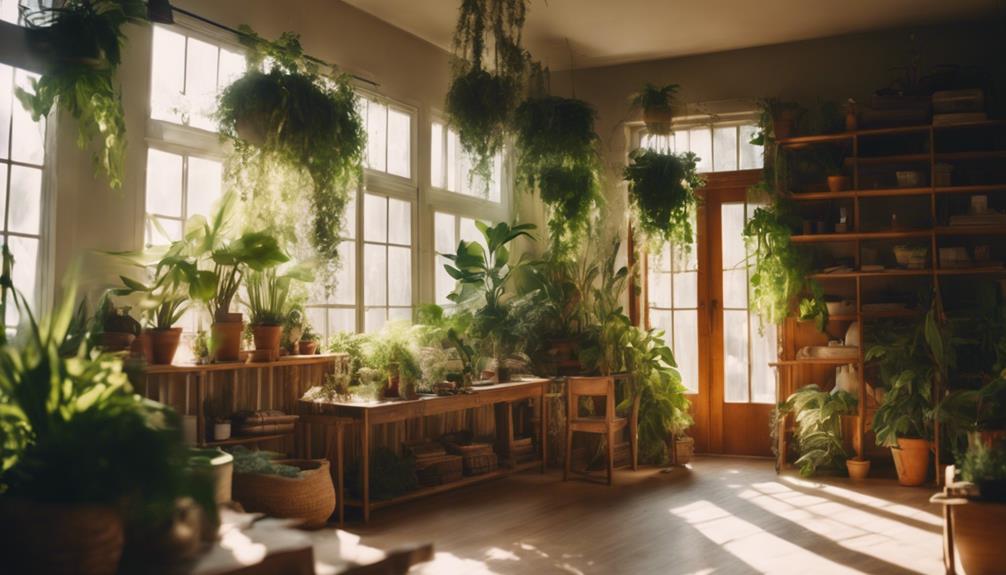
Light plays an essential role in shaping the ambiance of your home, influencing both mood and productivity. Natural light, in particular, can elevate your space, bringing nature indoors and creating a warm, inviting atmosphere. By maximizing exposure to sunlight, you can enhance your well-being and make your home feel more open and airy.
Here are three effective ways to increase natural light in your home:
- Ample Windows and Glass Doors: Installing larger windows or sliding glass doors allows sunlight to flood your living spaces, forging a strong connection with the outdoors.
- Skylights: Consider adding skylights to brighten areas that lack wall space for windows, transforming dark corners into vibrant spots filled with natural light.
- Mirrors: Strategically placing mirrors can reflect natural light throughout the room, creating an illusion of more space and amplifying the light's impact.
With these adjustments, you'll not only enjoy improved mood and productivity but also experience the dynamic atmospheres that natural light can create.
Embrace the beauty of sunlight and let it transform your home!
Enhancing Decor With Textures
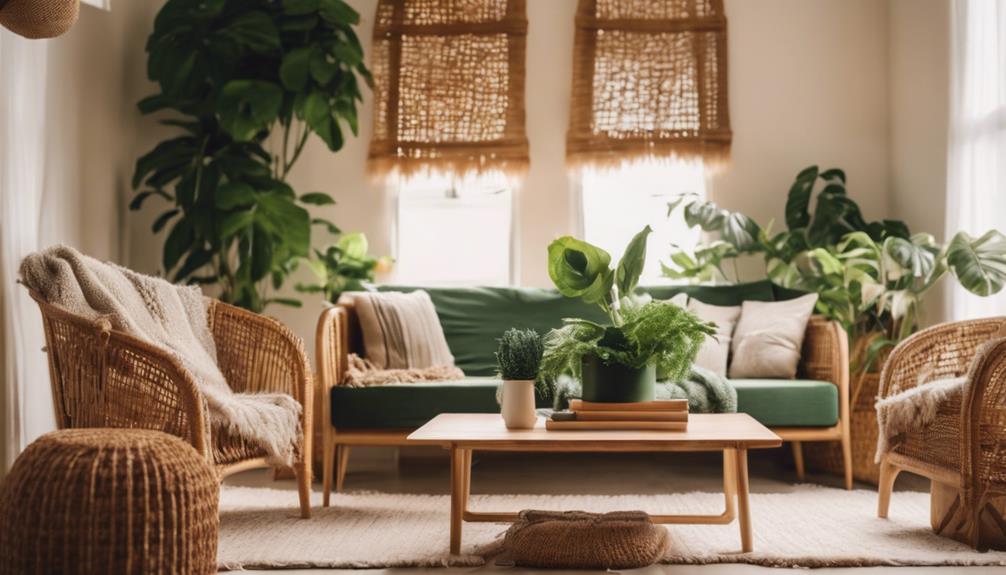
To enhance your decor, consider layering different natural textures that bring warmth and depth to your space.
Mixing patterns creatively, like pairing soft fabrics with bold designs, can create a dynamic atmosphere.
Incorporating unique materials, such as wood and stone, not only adds visual interest but also connects your home to nature.
Layering Natural Textures
Layering natural textures like jute, cotton, and grasscloth instantly adds depth and warmth to your decor, creating a calming atmosphere that invites relaxation.
When you incorporate these elements into your interior design, you not only enhance the visual appeal but also create a cozy environment conducive to well-being.
Here are three effective ways to layer natural textures in your home:
- Rugs and Throws: Start with a jute rug as your base and add cotton or wool throws on your sofa. This combination provides both softness and tactile appeal, making your space feel inviting.
- Wall Treatments: Consider using grasscloth wallpaper or wooden paneling. These natural materials bring warmth to your walls, creating a serene backdrop for your decor.
- Textured Accents: Incorporate textured pillows and woven baskets. They can introduce visual interest and create a layered look that feels organic and harmonious.
Mixing Patterns Creatively
Mixing patterns creatively can transform your space, adding visual intrigue and personality to your home decor. By incorporating a range of natural materials and textures, you can achieve a harmonious yet dynamic aesthetic. Start with layering elements like jute rugs and grasscloth wallpaper to create depth and a calming atmosphere.
Try mixing various patterns in your textiles, such as bold floral cushions paired with subtle striped throws. This contrast invites comfort while enhancing your room's overall appeal. Using natural materials like linen and cotton for your textiles introduces warmth, making your space feel inviting.
Aim for balance; combine bold patterns with softer textures to prevent overwhelming your design. For example, textured pillows can contrast beautifully against smooth furniture surfaces, creating a visually appealing and cozy environment.
Incorporating Unique Materials
Incorporating unique materials like wood, stone, and rich textiles instantly elevates your decor, adding warmth and inviting texture to your space. By integrating these natural materials, you create a cozy atmosphere that feels both stylish and grounded.
Here are three ways to enhance your decor with unique textures:
- Layer Textures: Combine jute rugs with linen or cotton throw pillows. This layering approach adds depth, inviting comfort while showcasing various elements in your home.
- Accent with Wallpaper: Use grasscloth wallpaper to introduce a striking textural element. This choice adds visual interest and creates a unique focal point on your walls.
- Choose Live Edge Furniture: Opt for live edge wooden furniture that highlights the natural beauty of the wood. It serves as both functional decor and a conversation starter.
Mixing smooth wood surfaces with rough stone accents can create a dynamic contrast, making your space feel more engaging.
Seasonal Inspirations for Spring
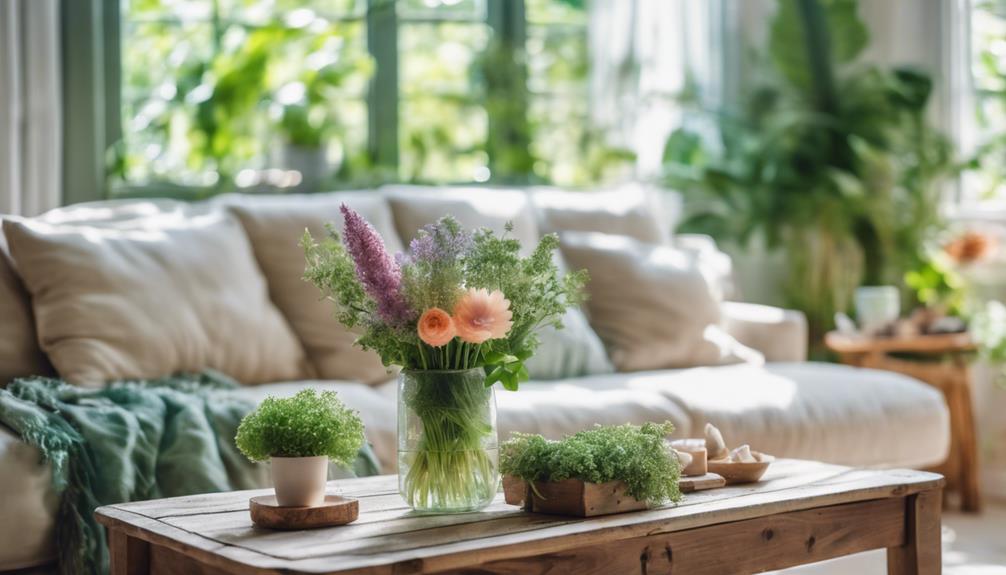
Spring offers a perfect opportunity to rejuvenate your home by embracing natural elements that enhance both ambiance and your connection to the outdoors.
Start by maximizing natural light in your living spaces with lighter window treatments. This simple change can boost your mood and create a new atmosphere that reflects the vibrancy of the season.
Incorporate decorative fruit displays in your kitchen, introducing vivid colors that make the space feel lively and inviting. Fresh fruits not only look great but also serve as a delicious snack. Additionally, consider starting an indoor herb garden. These aromatic plants provide culinary benefits while contributing to a greener, more organic feel in your home.
For a calming aesthetic, opt for seasonal styling schemes that emphasize neutral tones. This approach allows the beauty of your natural elements to shine without overwhelming the space.
Creative Ways to Use Water
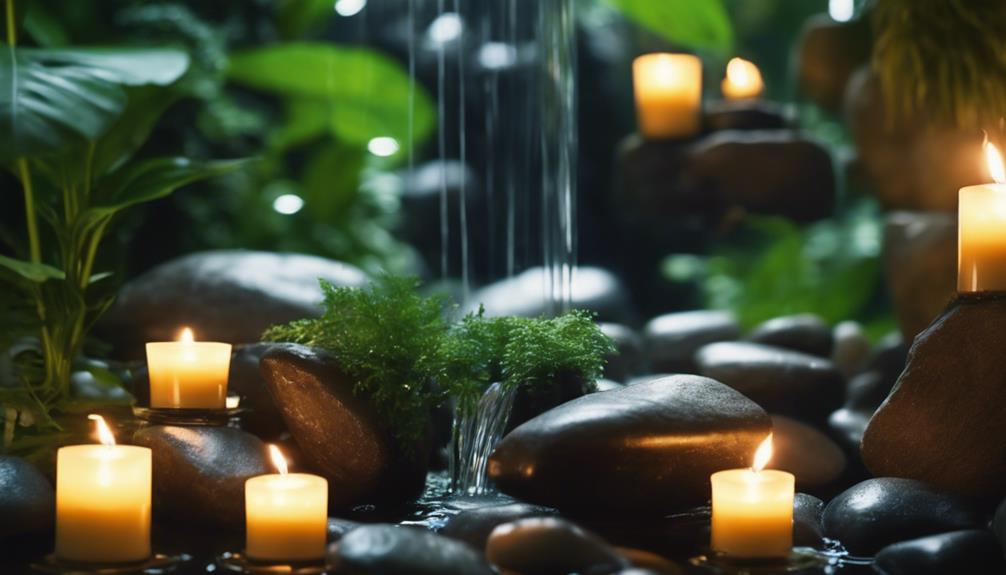
Using water features like indoor fountains or aquariums can transform your home into a serene oasis, enhancing relaxation and adding a unique focal point to your decor.
The soothing sounds of trickling water promote a calming atmosphere, making it an ideal addition to any room. Plus, these water elements can help improve humidity levels, contributing to better air quality and overall comfort in your space.
Here are three creative ways to incorporate water into your home design:
- Indoor Fountains: Set up a stylish indoor fountain in your living room or entryway. The gentle sound of flowing water will create a peaceful ambiance, drawing guests' attention.
- Aquariums: Consider an aquarium as a vibrant centerpiece. Not only does it add visual interest, but watching fish swim can also be incredibly relaxing.
- Water-Inspired Art: If you can't install physical water features, use artwork that depicts lakes, oceans, or serene landscapes to evoke tranquility and connect with nature.
Choosing Sustainable Materials
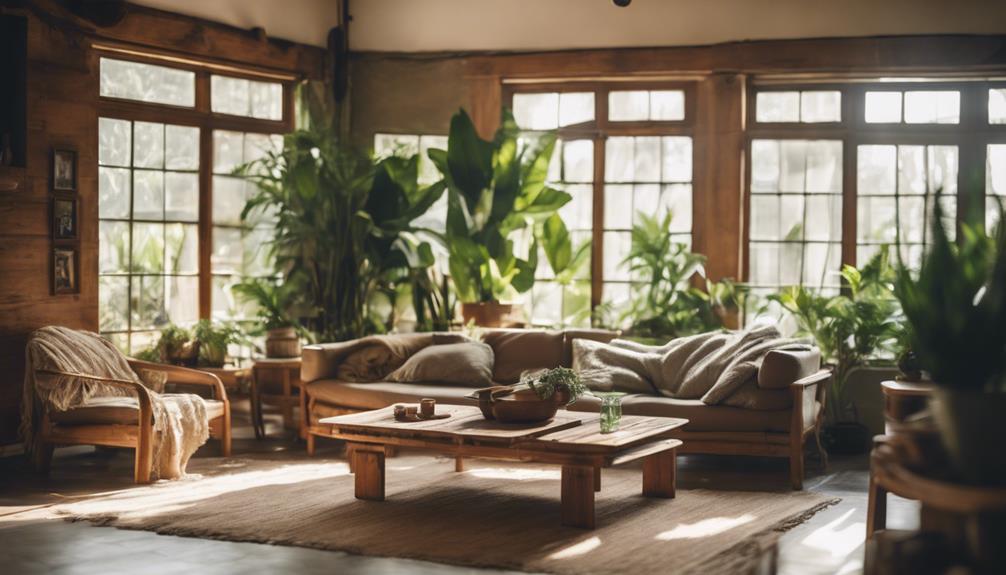
Choosing sustainable materials for your home decor not only benefits the environment but also adds unique character and warmth to your space. By opting for materials like bamboo, reclaimed wood, and recycled metals, you can greatly reduce your environmental footprint while infusing your home with distinctive charm. Sustainable materials often showcase rich textures and colors that synthetic options just can't match.
Natural finishes further enhance this aesthetic, creating a cozy atmosphere and promoting healthier indoor air quality. For example, using sustainably sourced wood furniture can help regulate indoor humidity and make your living space more inviting. Additionally, incorporating natural fibers such as wool, linen, and cotton guarantees your decor remains biodegradable and free from harmful chemicals typically found in synthetic alternatives.
Consider stone surfaces, too; they're durable, easy to clean, and require fewer harsh chemicals, making them a practical choice for a sustainable home. By choosing these materials, you not only enhance your home's beauty but also support responsible forestry practices and sustainable production methods.
Designing for Wellness and Harmony
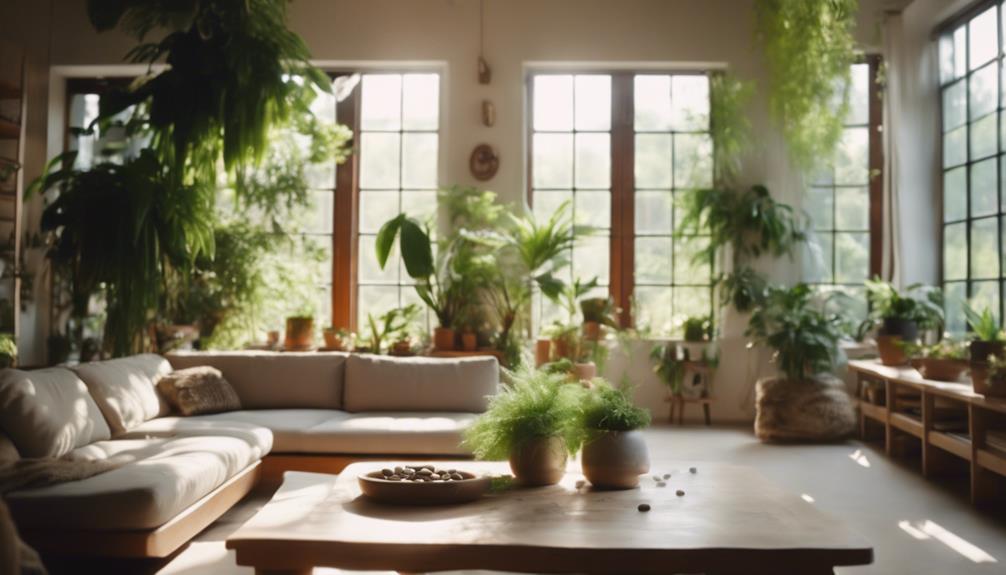
Incorporating natural elements into your home decor can create a calming atmosphere that promotes wellness and harmony. By embracing biophilic design, you can enhance your well-being and transform your living space into a sanctuary.
Here are three effective ways to achieve this:
- Add Plants: Integrate a variety of plants to purify the air and reduce stress. Their presence can notably uplift your mood and create a serene environment.
- Maximize Natural Light: Use ample windows and reflective surfaces to let in sunlight. This not only boosts your energy levels but also helps regulate your sleep cycles, contributing to a healthier lifestyle.
- Choose Eco-Friendly Materials: Opt for natural materials like wood, stone, and organic fibers. These choices not only improve indoor air quality by reducing allergens but also bring a sense of tranquility to your home.
Frequently Asked Questions
Why Is Nature Important in Interior Design?
Nature's essential in interior design because it creates serene environments that reduce stress and improve mood. By incorporating natural elements, you enhance your mental well-being, boost creativity, and foster a deeper connection to your surroundings.
What Design Is Inspired by Natural Elements?
Did you know that biophilic design can reduce stress levels by up to 60%? When you embrace natural elements like wood, stone, and plants in your spaces, you create a calming, inviting atmosphere that enhances well-being.
What Are the Elements of Design in Nature?
The elements of design in nature include organic shapes, natural textures, and earthy colors. You'll find inspiration in patterns like leaves and stones, which evoke tranquility and create a harmonious connection to the environment around you.
How Do You Decorate With Things Found in Nature?
You can decorate with things found in nature by collecting unique items like stones, twigs, or dried flowers. Create displays that reflect your adventures, and let these elements bring organic beauty and warmth into your space.
Conclusion
By weaving natural elements into your home decor, you're not just transforming your space; you're creating an oasis of tranquility.
Imagine lush greenery draping from your shelves, sunlight streaming through large windows, and the soothing sound of water flowing nearby.
Each texture and sustainable material you choose tells a story, wrapping your home in warmth and comfort.
Embrace this journey, and watch as your living space blooms into a vibrant sanctuary that nurtures your well-being and spirit.
Home Decor
The Latest Outdoor Furniture Trends for August – Upgrade Your Space Today!
Just in time for summer, discover how vibrant colors and sustainable designs can transform your outdoor space into a stylish retreat!
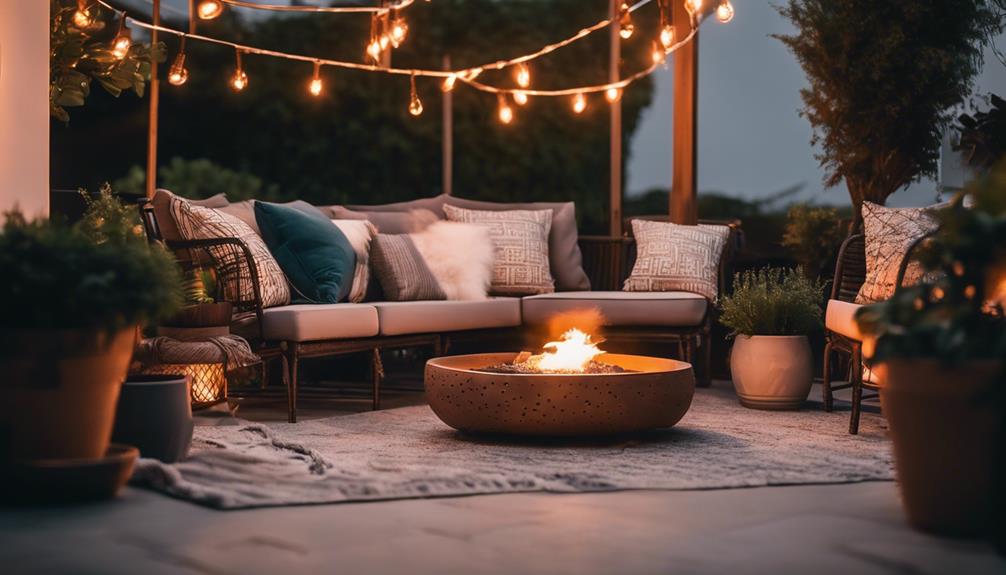
This August, you can upgrade your outdoor space with the latest furniture trends that focus on vibrant colors, sustainable materials, and multifunctional designs. Think bold hues like ruby red and cobalt blue paired with eco-friendly materials such as reclaimed wood and bamboo. Modular lounge sets offer flexibility, while mixed materials create unique aesthetics. For added comfort, choose indoor-quality textiles that make your outdoor area feel cozy. Don't forget smart technology, which enhances ambiance and convenience. Get ready to transform your outdoor living experience into something remarkable; explore more trends to perfect your space!
Key Takeaways
- Embrace vibrant colors like cobalt blue and ruby red to create lively outdoor spaces perfect for summer gatherings.
- Incorporate modular and multifunctional furniture designs to maximize utility and adapt to diverse outdoor activities.
- Choose sustainably sourced materials like FSC-certified wood and recycled plastics to minimize environmental impact and enhance durability.
- Explore antique-inspired and vintage pieces to add character and a unique style to your outdoor decor.
Sustainable and Eco-Friendly Materials
As the demand for outdoor furniture grows, you'll find that sustainable and eco-friendly materials are becoming essential for creating stylish and environmentally responsible spaces. Utilizing sustainable materials like responsibly sourced wood certified by the Forest Stewardship Council (FSC) not only enhances durability and style but also supports responsible forestry practices.
Recycled materials, such as plastics repurposed into eco-friendly composites, are also gaining popularity. These materials contribute to outdoor furniture design that's both stylish and comfortable while greatly reducing environmental impact. When you choose furniture made from these eco-conscious options, you help decrease landfill waste and lower carbon footprints.
Bamboo and reclaimed wood are excellent choices if you're looking for a unique touch that promotes a healthier planet. Investing in these materials guarantees your outdoor space isn't only visually appealing but also aligns with your commitment to sustainability.
Modular Lounge and Multifunctional Sets
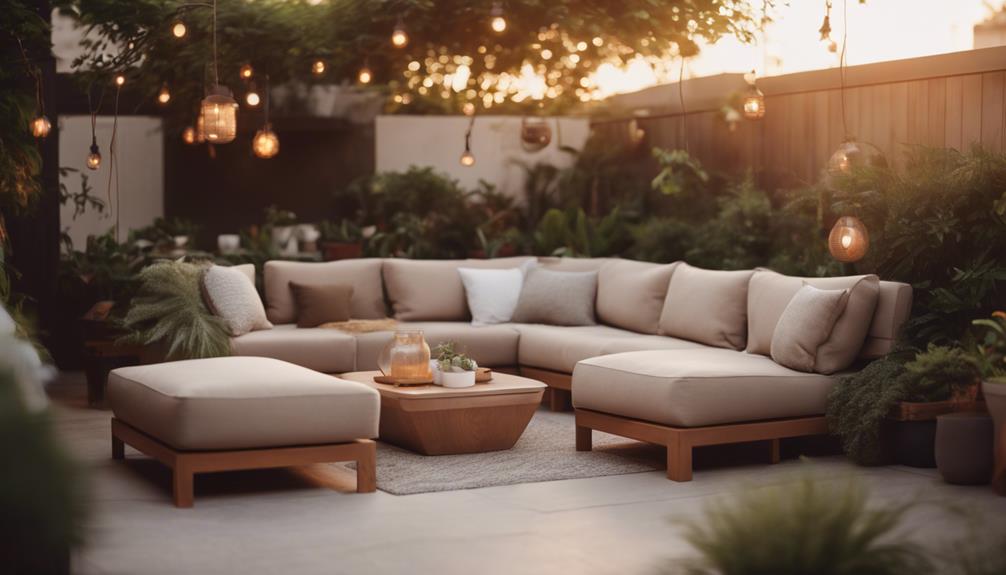
Looking to enhance your outdoor area?
Modular lounge and multifunctional sets offer the flexibility and style you need to create the perfect space for relaxation and entertainment. With modular lounge sets, you can rearrange pieces to fit any outdoor living spaces, whether you're working with a small patio or an expansive deck.
These sets typically feature weather-resistant wicker and come with comfortable cushions in trendy colors, ensuring you enjoy both durability and aesthetics during your gatherings. Multifunctional designs, such as convertible tables and storage-integrated seating, enhance utility and maximize limited outdoor square footage, making them ideal for various activities, from lounging to dining.
The beauty of these pieces lies in their flexible and adaptable nature, allowing you to create personalized configurations that suit your lifestyle. As outdoor living spaces continue to gain popularity, the demand for these innovative furniture options is rising.
Embrace the trend and transform your outdoor area into a stylish haven that meets all your needs, combining comfort, functionality, and design in one cohesive package.
Mixed Materials for Unique Styles
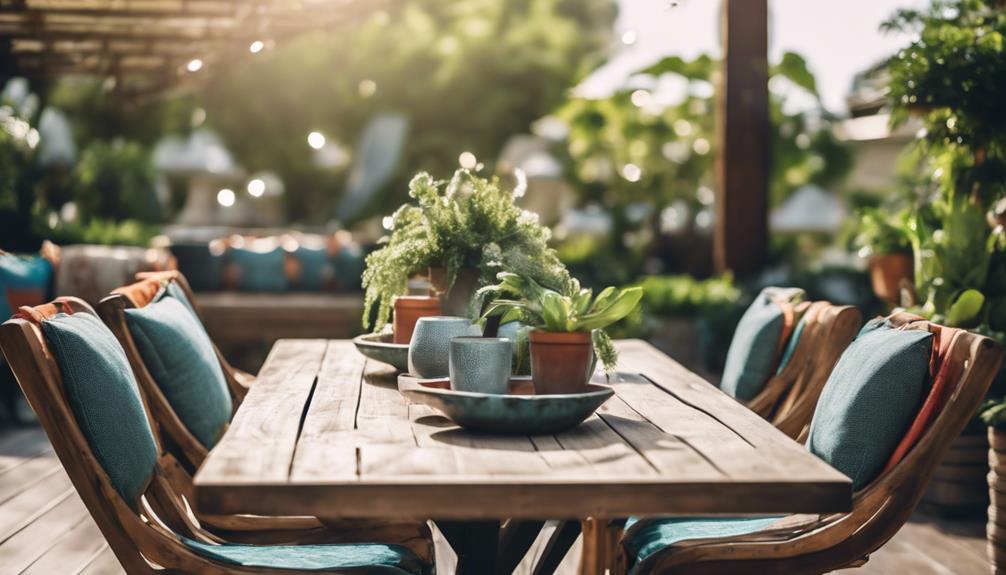
Mixing materials in outdoor furniture creates striking designs that elevate your space with unique styles and textures. This trend allows you to combine elements like teak wood and aluminum, resulting in visually appealing pieces that enhance your outdoor aesthetic.
For instance, incorporating wicker chairs with metal frames offers a stylish contrast, perfect for diverse design preferences. You might love the sophistication of glass tabletops paired with wooden bases, adding depth to your outdoor dining experiences. This combination not only looks great but also makes gatherings feel more inviting.
The flexibility of mixed materials encourages creativity in your outdoor designs, enabling you to personalize your space while maintaining a cohesive look. Popular combinations, such as acacia wood with rope, reflect contemporary trends in outdoor furniture style, providing both durability and character.
Vibrant Colors and Patterns
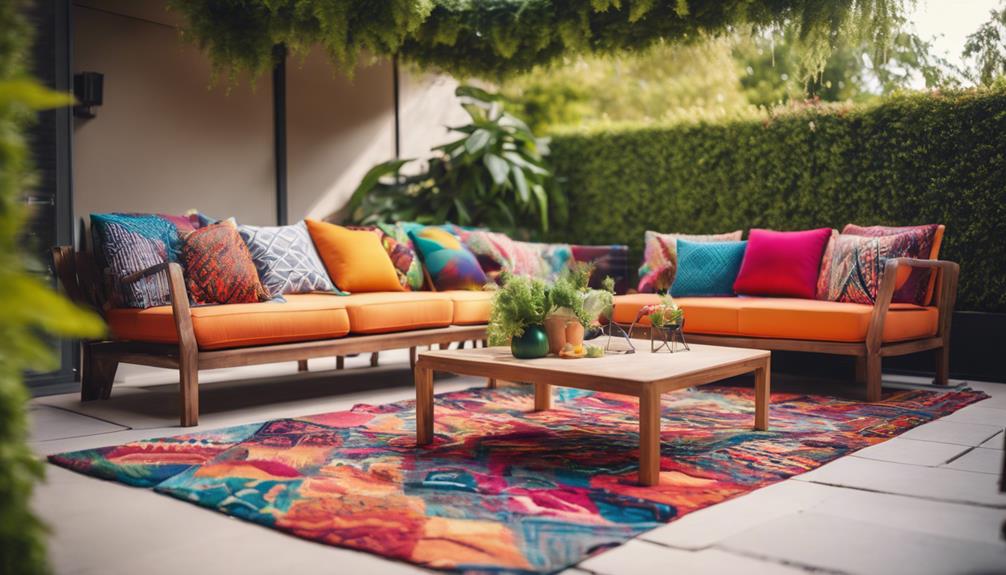
When it comes to outdoor furniture, you're seeing eye-catching color combinations and bold pattern choices take center stage.
This August, don't shy away from vibrant hues and playful designs that reflect your personal style.
Embracing seasonal color trends can transform your outdoor space into a lively and inviting retreat.
Eye-Catching Color Combinations
Vibrant colors like ruby red and cobalt blue are transforming outdoor spaces, making them feel more alive and inviting. These eye-catching color combinations are becoming essential for anyone looking to elevate their patio or garden. By incorporating bold colors alongside earthy tones, you create a balanced yet dynamic atmosphere that enhances your outdoor experience.
Think about using vibrant hues in your outdoor textiles, like cushions and throws, to add layers of visual appeal. A bright yellow throw against an olive green sofa can instantly energize your space, reflecting your personal style. Mix and match these colors to create expressive outdoor spaces that truly resonate with you.
Don't shy away from experimenting! Combining jewel tones with more muted shades can lead to stunning results, making your outdoor area both welcoming and stylish. Remember, this trend encourages you to showcase your unique taste while enjoying the beauty of nature.
Bold Pattern Choices
Incorporating bold patterns alongside those striking colors can transform your outdoor space into a vibrant oasis that reflects your unique style. This month, embrace bold pattern choices, featuring cheerful florals and dynamic stripes, to create visual interest in your outdoor areas. Outdoor cushions are a fantastic way to introduce these lively designs while providing comfort for your guests.
Consider pairing vibrant colors with jewel-toned accessories and earthy tones to elevate your outdoor aesthetic. This combination not only adds energy but also promotes a serene atmosphere, making your space feel more welcoming and relaxed. Here's a handy table to help you explore some great combinations:
| Pattern Type | Color Palette | Suggested Accessories |
|---|---|---|
| Floral Patterns | Ruby Red & Cobalt Blue | Jewel-toned throws |
| Stripes | Sunny Yellow & Aqua | Earthy-toned planters |
| Geometric Designs | Emerald Green & Coral | Vibrant outdoor cushions |
Seasonal Color Trends
August brings a burst of energy to outdoor spaces with its seasonal color trends, showcasing lively hues like ruby red, cobalt blue, and sunny yellow. These vibrant colors can transform your outdoor decor, creating cheerful environments perfect for summer gatherings. By incorporating bold patterns and playful textiles, you can elevate your space's overall aesthetic.
Here are some ideas to infuse your outdoor area with these seasonal color trends:
- Accent Cushions: Choose cushions in ruby red or cobalt blue, featuring fun patterns that tie your decor together.
- Table Settings: Use vibrant tableware in sunny yellow to brighten up your dining experience.
- Outdoor Rugs: Opt for rugs with bold stripes or florals to add depth and character to your patio.
- Decorative Accessories: Incorporate jewel-toned vases or lanterns that complement earthy tones, balancing energy and relaxation.
These elements won't only enhance your outdoor area but also invite warmth and joy, making your space a go-to spot for friends and family all summer long.
Embrace these vibrant hues, and watch your outdoor oasis come alive!
Minimalist and Organic Designs
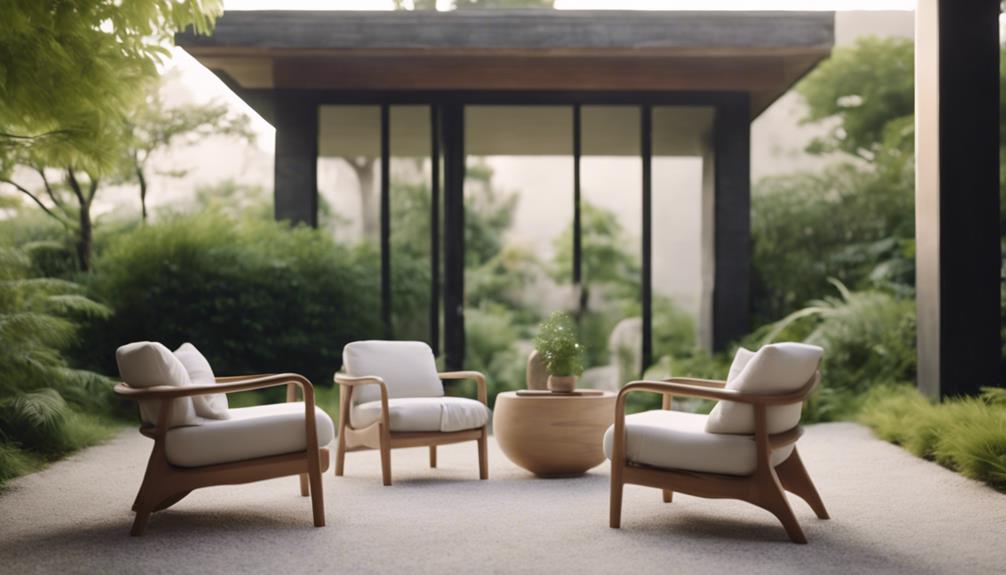
When you're looking to refresh your outdoor space, minimalist and organic designs are a perfect choice.
You'll appreciate the functional simplicity and natural materials, which create a serene atmosphere while keeping your area stylish and clutter-free.
Embracing these trends not only enhances your environment but also offers versatile solutions for modern outdoor living.
Natural Material Aesthetics
Embracing natural material aesthetics in outdoor furniture allows you to connect with nature through the beauty of teak, bamboo, and reclaimed wood. This trend emphasizes sustainable and eco-friendly materials, creating a serene and inviting atmosphere for your outdoor space.
With minimalist designs, you'll appreciate clean lines and simple shapes that enhance elegance without overwhelming your environment.
Here are four key aspects to reflect on when selecting outdoor furniture that embodies natural material aesthetics:
- Organic Textures: Look for pieces that highlight the unique grains and patterns of wood, adding depth and warmth to your space.
- Neutral Colors: Opt for neutral tones that seamlessly blend with your landscape, promoting a calming and cohesive look.
- High-Quality Materials: Choose furniture made from durable, sustainable materials that withstand the elements while maintaining their beauty.
- Modern Design: Integrate contemporary elements with natural features, creating a harmonious balance that feels inviting and invigorating.
Functional Simplicity in Design
Functional simplicity in outdoor furniture design focuses on clean lines and organic materials, making your space both stylish and inviting. Minimalist outdoor furniture embodies this principle, emphasizing sleek designs that complement modern outdoor spaces. By choosing pieces with functional simplicity, you create an environment that feels open and airy.
Organic designs are also gaining popularity, utilizing natural materials like bamboo and reclaimed wood. These choices not only enhance the aesthetic but also promote a sustainable and eco-friendly approach to decorating your outdoor areas. Incorporating organic textures can add warmth and a rustic feel, making your outdoor spaces more inviting.
Monochromatic color schemes further elevate minimalist designs, providing a cohesive and sophisticated look. This versatility allows you to mix and match with various decor styles and personal preferences. Functional simplicity guarantees that your outdoor furniture isn't just beautiful but also practical, making it easy to enjoy your space without overwhelming it with unnecessary clutter.
Antique-Inspired and Vintage Furniture
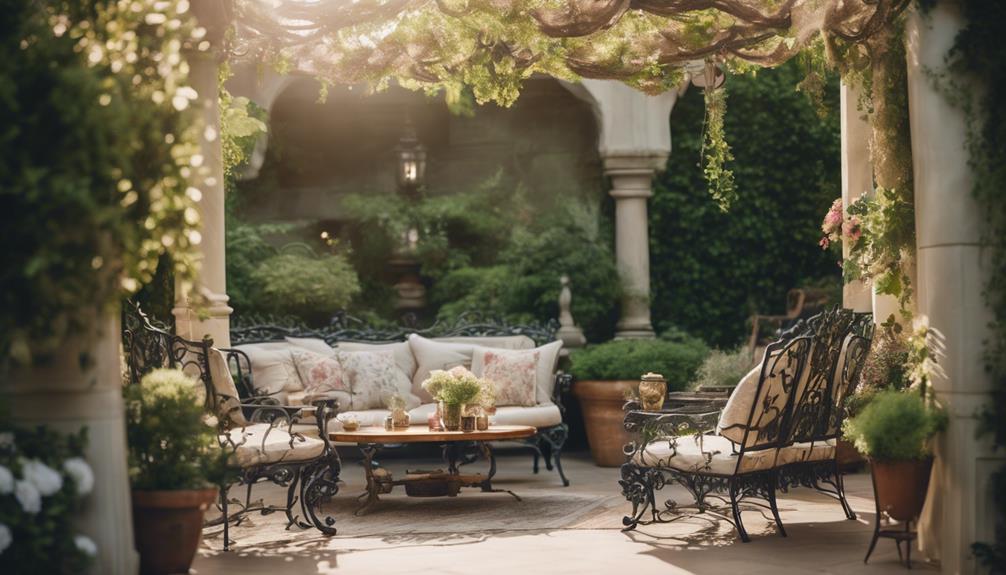
Antique-inspired outdoor furniture, like garden benches and wrought iron chairs, brings a nostalgic charm to your outdoor space that many find irresistible. If you're looking to enhance your outdoor living areas with vintage aesthetics, consider these key elements:
- Material Matters: Opt for weathered teak or rustic metal finishes. These materials not only add character but also guarantee durability.
- Sustainable Choices: Incorporating vintage pieces promotes sustainability by repurposing items, helping reduce waste and environmental impact.
- Unique Style: Mixing antique-inspired furniture with modern elements creates a visually interesting contrast. It allows you to express your personal style while inviting a sense of nostalgia.
- Charming Accents: Add vine-covered trellises or quaint patio sets to evoke warmth and history in your outdoor spaces.
Indoor-Quality Textiles for Comfort
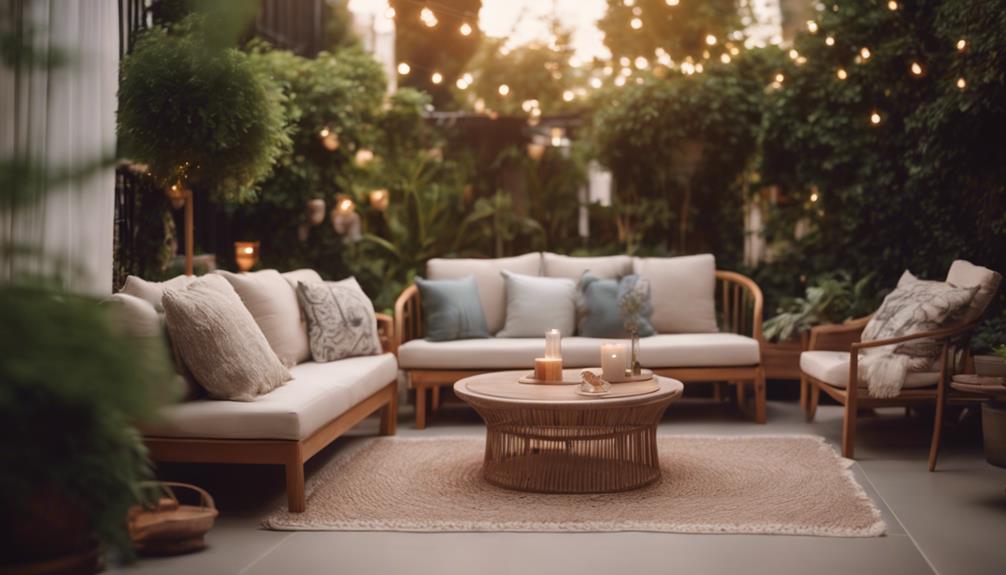
Transform your outdoor space into a cozy retreat by incorporating indoor-quality textiles that offer unparalleled comfort and style. Today's outdoor furniture trends emphasize the importance of luxurious cushions and deep seating options, making your outdoor areas feel just as inviting as your indoor ones. With weather-resistant fabrics like those from Sunbrella, you can guarantee your cushions and throws withstand the elements while providing that sought-after comfort.
Layering textiles is key to achieving a warm atmosphere for those cooler evenings. Consider adding outdoor rugs and throw pillows in various colors and patterns to suit your personal style. This not only enhances comfort but also creates a visually appealing environment.
Plus, don't overlook the significance of easy maintenance. Choosing textiles that are simple to clean means you can enjoy your outdoor spaces without worrying about extensive upkeep.
The trend of using indoor-quality textiles in outdoor furniture blurs the lines between indoor and outdoor aesthetics, allowing you to create a seamless flow in your home. By focusing on these elements, you can upgrade your outdoor area into a stylish and cozy haven.
Smart Technology Integration
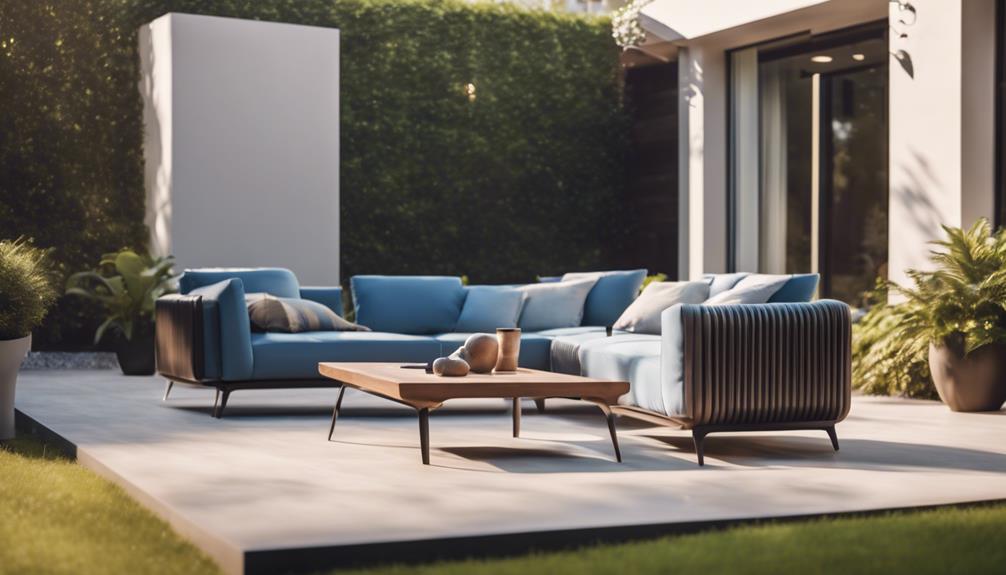
Smart technology integration is revolutionizing outdoor living by adding features like built-in Bluetooth speakers and USB charging ports that enhance your outdoor experience. As you upgrade your outdoor spaces, consider how these innovations can transform your enjoyment and convenience.
Here are four key features to look for in modern outdoor furniture:
- Smart Lighting Systems: Control your ambiance with smart lighting that adjusts based on your mood or time of day.
- Bluetooth Speakers: Enjoy your favorite tunes while entertaining or relaxing under the stars with integrated Bluetooth speakers.
- Home Automation Compatibility: Seamlessly connect your outdoor furniture to your home automation system, allowing you to manage lighting, heating, and music right from your smartphone.
- Sustainable Solutions: Opt for solar-powered lighting options that not only illuminate your space but also promote energy efficiency.
Frequently Asked Questions
How to Market Patio Furniture?
To market patio furniture effectively, focus on eco-friendly materials, showcase vibrant colors on social media, run targeted email campaigns during peak seasons, collaborate with home influencers, and create engaging content demonstrating versatility and multifunctionality.
What Color for Outdoor Cushions?
When choosing colors for outdoor cushions, consider bold options like ruby red or cobalt blue for vibrancy, or earthy tones like terracotta for relaxation. Patterns can add a playful touch, enhancing your outdoor space's aesthetic.
Conclusion
As you explore these exciting outdoor furniture trends, remember that 73% of homeowners say their outdoor spaces are just as important as their interiors.
By opting for sustainable materials or embracing vibrant colors, you can create a stylish oasis that reflects your personality.
Whether you choose multifunctional sets or vintage-inspired pieces, your outdoor area will become the perfect spot for relaxation and entertaining.
So, why wait? Upgrade your space today and enjoy the great outdoors in style!
-
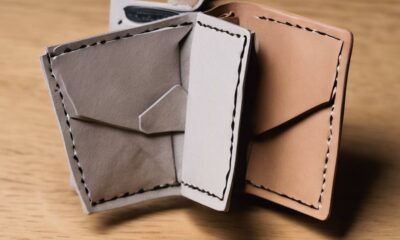
 Vetted1 month ago
Vetted1 month ago14 Best Personalized Father's Day Gifts for Your Husband – Show Him You Care
-

 Alfresco1 month ago
Alfresco1 month agoAlfresco Stacker Doors: Seamless Indoor-Outdoor Living!
-

 Craft and Textiles3 months ago
Craft and Textiles3 months ago15 Best Places to Buy Appliances for Your Home – Top Retailers Reviewed
-
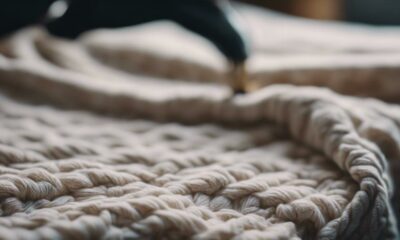
 Decorative Throws3 months ago
Decorative Throws3 months agoIs It Better to Dry Clean Blankets?
-
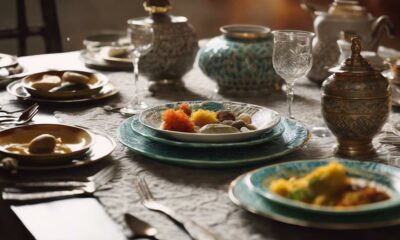
 Tableware and Dining Accessories3 months ago
Tableware and Dining Accessories3 months agoWhat Is the Hindi Meaning of Tableware
-
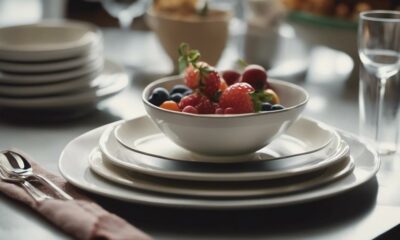
 Tableware and Dining Accessories3 months ago
Tableware and Dining Accessories3 months agoWhat Is the Meaning of the Word Tableware
-
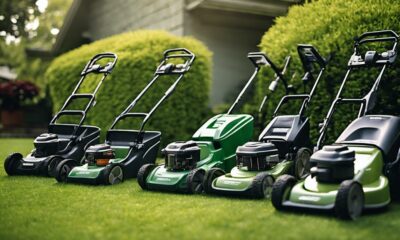
 Craft and Textiles3 months ago
Craft and Textiles3 months ago15 Best Cordless Mowers for Effortless Lawn Care – Top Picks of 2024
-

 Yarn3 months ago
Yarn3 months agoIs Yarn Natural or Manmade? Unravel the Truth
























